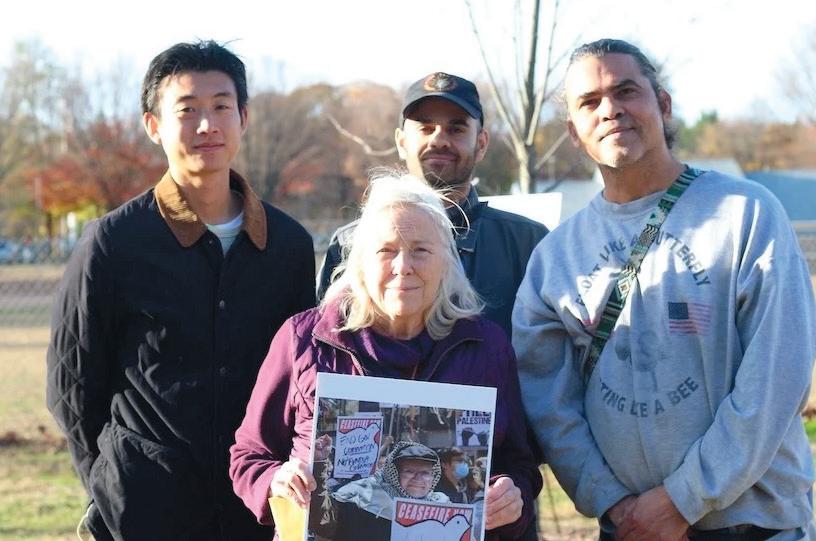INNER-CITY INNER-CITY

Miriam Westheimer, Founder of the National Home Visiting Network and Chief Program Officer of Home Instruction for Parents of Preschool Youngers (HIPPY)


Miriam Westheimer, Founder of the National Home Visiting Network and Chief Program Officer of Home Instruction for Parents of Preschool Youngers (HIPPY)
Honoring Parents and Strengthening Communities

Lucy Gellman, Editor, The Arts Paper newhavenarts.org
The names rang out in the fall air, making their way across Goffe Street Park.
Sixty-three-year-old Luis Timbila, hit by a car on State Street in the early hours of a warm November morning. Twentyfour-year-old Nicolas Baltazar-Consepcion, struck by a garbage truck at Church Street and North Frontage Road. Seventy-year-old Yusuf Gürsey, a kind-hearted peace activist who was killed on Whalley Avenue while walking home from a demonstration.
The names kept coming. Across the grass, a large sign beside a bike urged Less Talk More Action. Three hundred and forty-two flags, each representing a life lost prematurely, flapped in the wind. For a minute, it felt impossible that the world could just keep going.
Safe streets advocates, elected officials, bereaved families, cyclists, and friends gathered Sunday afternoon to observe the World Day of Remembrance for Road Traffic Victims (WDR), a global recognition of lives lost to traffic violence each year. Around five dozen people attended, many holding framed photographs of the friends and family members they had lost. Of the politicians who attended, very few suggested tangible action items that they will implement to actually make Connecticut safer for pedestrians and cyclists. The World Health Organization reports that 1.9 million people die in incidences of traffic violence each year., making it the leading cause of death among people between the ages of five and 29. In the past month alone, that number has very nearly included artist-activist Nika Zarazvand, who was injured after a hit-and-run at Vivan las Autonomas’ Día de Muertos celebration earlier this month.
Zarazvand has been advocating for justice in the case of Roya Mohammadi, whose aunt Khurshida was killed in a hitand-run in West Haven last year—showing just how intertwined the lives of those lost and injured senselessly by cars may be.
“Each person whose name we remember here today is still making a palpable difference on the world,” said Rev. Heidi Thorsen, assistant rector at Trinity Church on the Green. Just last week, a 63-year-old man was hit and critically injured within half a block of the church while crossing Chapel Street. “We are woven together in the moves we make through the world … remember that these are human beings.”
Since WDR on Nov. 19 of last year, Watch for Me CT has recorded almost 350 known victims of traffic violence in the state. It is an epidemic that crosses lines that are both geographic and generational: victims range from just one-year-old— Camila Elizabeth Ramirez-Carcamo, killed in a hit-and-run in Hartford in early June—to elders struck on their afternoon walk around the neighborhood. In 2024, that included 10 people in New Haven alone. While the city’s rate is slowly declining, said Mayor Justin Elicker, even one death is far too many.

Sunday, several speakers lent a human face to those statistics, urging those there to remember each individual victim, and transform their grief and anger into action. Holding a portrait of New Havener Yusuf Gürsey, Hamdenite and fellow peace activist Mary Compton mourned the loss of her friend, a scholar and fierce advocate for peace who often decried the very lack of pedestrian infrastructure that ultimately killed him. For decades, Gürsey was one of the people who would naturally, instinctively show up—despite the fact that it took one or more buses and pounding the pavement to do so. His feet were his primary mode of transportation.
“We could count on him being there, no matter the weather,” she remembered.
As a member of the Greater New Haven Peace Council, Compton came to know him as a fixture in the movement. Over the years, the two became close, there during chilly fall and winter marches and hot summer mornings remembering the bombings of Hiroshima and Nagasaki on the New Haven Green. “He took a stand on the side of justice, and remained faithful to the cause.”
In April of this year, Gürsey was walking home from a march for Palestinian lives when he was struck and killed by a driver around Whalley Avenue and Brownell Street, just beyond the intersection with Ella T. Grasso Boulevard. Despite frequent pedestrian and bus use and two clearly marked crosswalks, the intersection does not have lighted pedestrian signals. Drivers rarely slow down as they approach it.
“What hurts is that he was so aware” of the gaps in pedestrian infrastructure, said his friend John Lee after the event.
Gürsey often spoke about how often people parked in front of bus stops, or how the city failed to clear snow and ice from those stops during the winter. Living off of Whalley, he saw the danger that cars


put people in every day. He spoke passionately of the change that the city needed to make to be a safer place for everyone.
“I remember him as being deeply principled,” Lee added. “There was never a doubt that he would show up.”
home from a baseball game in 2022. In a different universe, he would have started his junior year at the University of Connecticut this fall.
“These moments are etched in my mind,” Roux said, recalling step by step the night her youngest son was killed. In the grass, several friends and family members hugged framed portraits of Luke in his burgundy graduation gown, a red-and-white tassel dangling beside his right cheek.
That summer evening, Luke—a newly minted high school grad—had played a baseball game at a field nearby, just 10 or so minutes from the family’s home. The mood was festive: it was one of his best games, she recalled. When it was over, Carri headed back to the house to walk the dog. She expected her son to be back by the time she returned. When he wasn’t, she checked her phone for his location. What she saw made her pause, and then pause gave way to worry. Luke’s phone showed him at an intersection close to the family’s home—but the dot wasn’t moving, as it would if he were driving. It remained stationary long after a light would have changed. It was then that “a pit began to form in my stomach,” she recalled. When she headed to the intersection, her growing fears were confirmed. Flashing lights and emergency medical personnel filled the street. She remembered the EMTs, the white fabric of her son’s baseball uniform. She later learned that a drunk driver had left a rowdy tailgate at a music venue in Hartford, gotten in his car, and sped more than 40 miles over the speed limit.
When he blew through a stoplight, killing her son, it had already been red for 18 seconds.
Even before the hospital, the doctors, “the news that my heart already knew,” Carri knew that her youngest child was gone. She knew that her family could never be the same. She also knew that Luke’s death was entirely preventable.
“Our culture needs to change,” she said, advocating for changes from better business practices to legislative policy. Had there been a better system of checks in place that night—like someone to administer a breathalyzer test at the venue, or take away the driver’s keys, or order a rideshare to take him home—her son would likely still be alive.
Fellow speakers stressed that traffic violence can happen anywhere, at any time, to anyone if drivers fail to practice safety behind the wheel. Speaking with an occasional catch in her throat, Farmington resident Carri Roux remembered the night that her son, 17-year-old Luke Roux, was hit and killed by a drunk driver on his way
Instead, “my family was left broken,” she said. While it’s her son’s memory that pushes her to fight, the pain of it is also immense and profound. When people ask how many children she has, she said—a seemingly innocuous question—she’s had to craft an answer that doesn’t require a long explanation. “My husband and I were blessed with three sons,” she tells people. Every time, it’s still a wound. That trauma is an ecosystem, added Sgt. Charles Grasso, a retired first responder who worked decades in emergency services, and now works as a crash data liaison at the Connecticut Transportation Institute. Not only are families, friend groups and communities gutted by unexpected loss—the medics, police and
Lucy Gellman, Editor, The Arts Paper newhavenarts.org
Lorivie Alicea studied the cool coconut cream for just a moment, admiring her handiwork before it started to melt. Atop the just-shiny, periwinkle sides of the scoop, flecks of homemade matcha turned into tiny land-masses, as if it was a globe. The sides looked satiny, as if it had been polished. Any closer, and she could smell the gentle coconut, the fruity notes of blue pea. She lifted a wafer-thin wedge of her signature “dark matter” cone, and placed it in the center of the confection.
In every step, she was channeling a lifetime of cooking, from her grandmother’s hand-pressed juices in Bayamón to late night recipe tests with coconut milk, a KitchenAid mixer and a creamy, sweet dream of something beyond a shop in San Juan.
Alicea is one of the chefs behind Vía Láctea CT, a new plant-based sweets shop specializing in frozen desserts and vegan baked goods at 2 Whitney Ave. in the Whitney-Audubon Retail District of New Haven. Tuesday afternoon, she gathered with city officials, New Haven boosters, representatives of Yale Properties and co-owner and chef Reinaldo Sánchez to officially inaugurate the shop.
Inside the bright storefront, the two sell an array of frozen treats, from coconut milk based ice cream and sorbet to pecan brownies and cookies studded with gooey, plant-based chocolate chips. While both hail most recently from San Juan, Sánchez now lives in East Haven; Alicea still splits her time between New Haven and Puerto Rico.
“It’s truly an honor to celebrate the opening of Vía Láctea here at the heart of the Whitney-Audubon district,” Sánchez said Tuesday, eyeing a pair of comically large scissors that would soon be in his hands. “This vibrant and diverse community feels like the perfect place to continue our journey, and we are thrilled to bring our galaxy of flavors to New Haven.”
The story of Vía Láctea, which this year was named a James Beard Foundation Awards Semifinalist, begins in San Juan, where both Sánchez and Alicea grew up. As a kid, “I always wanted to be a chef,” Sánchez said. At home, his grandmother helped raise him while his mom ran an art studio that would ultimately connect him with Alicea. It instilled in him a deep, almost reverent love for food: he asked for a rice cooker before the time he was a teenager, and became a self-taught chef as the cooker grew up with him.
In Bayamón Alicea also grew up under her grandmother’s watchful eye, learning to trust local foodways as the two picked fruit on her small farm, hand-pressed juices and made traditional desserts like majarete (a warming, silky-smooth corn pudding) and candied green papaya. By early adulthood, she was working as the pastry chef at Bodegas Compostela, a farm-to-table Spanish restaurant in San Juan. After long days at work, she would go home and experiment with ice cream

recipes using just her KitchAid mixer and a handful of ingredients.
Finding the right plant-based recipe took time—and the right combination of ingredients. Coconut milk, Alicea explained, is a kind of superstar in this regard: it has enough fat content to mimic the creaminess and heft of dairy, with a flavor that is sweet, a little floral and nutty, and still mild enough to take on other flavor profiles. Enter early visions of deep, rich dark chocolate, bright guava and passionfruit, cazuela de calabaza and ginger root— flavors that have since become Vía Láctea mainstays in both Puerto Rico and Connecticut.
“This has been such a beautiful and heartwarming experience to be, in less than a year, opening our second location abroad,” she said of the shop’s growth since those first beta tests years ago. “I’m so, so thankful for everyone that extended their help.”
It was not always the shop it is now, Sánchez added. When the two started a bakery in San Juan in 2017, their menu included dairy. As they got established, they made every item from scratch, using locally sourced ingredients whenever possible. It gave them the same kind of culinary foundation that they have in New Haven, in which every component—from pumpkin puree and squash-kissed coffeecake to their sesame candy—is handmade in their kitchen.
From the jump, those included seasonal and temporary flavors, like a coquito that
ran during the winter months, or wildberry and matcha-passionfruit, or the vanilla-scented, chewy red banana, harvested from small farmers on the island for a totally unique flavor profile. At some point, dairy became obsolete: the longer the shop was open, the more popular plantbased items became.
At some point, Sánchez recalled, they made the decision to stop selling dairy entirely. Not only did it save costs—milk products are both expensive and perishable—it was also healthier and more sustainable, while still allowing the duo to experiment with flavors and baked goods that rotated with the seasons and holidays. The coquito, for instance, grew out of wanting something traditional around Christmas.
But running a frozen dessert shop in San Juan was also difficult for reasons beyond their culinary control (it still is; the storefront in Puerto Rico is still very much open). Waves of political and economic unrest, cycles of hurricane recovery, and old infrastructure subjected them to rolling blackouts, in which desserts could melt, ingredients might spoil, and employees’ shifts would be canceled at the last minute.
It felt unsustainable. While the two installed a solar array that now generates 50 percent of the energy they need, the other 50 percent relies on a power grid that is fundamentally unreliable. “We were desperate to leave the island, because the island is very unstable right now,” Alicea
Orchards, turning them into a bright, coral-colored pumpkin puree for a special pumpkin flavor.
While Sánchez and Alicea are not vegan themselves, they are sensitive to dietary restrictions, including and especially nuts, Sánchez added. To avoid allergens in their desserts, they only cook with nuts on certain days, keeping those ingredients separate as they cook, freeze, and clean the kitchen. Just as in San Juan, every component is hand-made, from a crumbly, sweet and spicy coffeecake to their signature matcha cookies and “dark matter” cones, made with activated charcoal.
They have a strong culinary palette to show for it. The matcha is smooth and surprisingly subtle, without the powdery grit or bitterness that sometimes comes from using green tea powder. Their pastel-toned “Home Planet,” with bits of matcha and butterfly pea powder, strikes a balance between almost fruity and floral, like early spring on the tongue. The coffee chip, meanwhile, is a testament to Alicea’s background as a pastry chef, with slow-blooming, intense layers of coffee flavor, hints of coconut, whisper-thin chocolate crackles and the just-right balance of salt.
said.
“I call it survival,” Sánchez added with a tight smile after the ribbon cutting. Meanwhile, the two thought about expanding their business beyond the island. Thirteen months ago, Sánchez enrolled in New Haven’s “DNA of an Entrepreneur" program, a now-remote initiative of the city’s Small Business Resource Center that teaches business development, human resources and marketing, and financial literacy. He connected with the Community Foundation for Greater New Haven, learning about resources like the New Haven Equitable Entrepreneurial Ecosystem (NHE3). It gave him a launchpad so that when he arrived in the city, those small business dreams could become a reality.
“I’m really proud of him,” said Cathy Graves, deputy director of economic development for the city and an early fan of the coffee chip. “He was so dedicated, in class every Monday night. It’s been a journey.”
In New Haven, Vía Láctea is growing that plant-based footprint with an eye toward ingredients that are more frequently used in Connecticut and New England, like fresh summer berries and maple syrup (as he bounced through the kitchen, Sánchez said he is already dreaming of a maple pecan). This fall, for instance, the shop sourced fresh pumpkins from the Guilford-based business Bishop’s
“We’re excited to become a part of this community, to collaborate, and to create moments of joy through our desserts,” Sánchez said, adding that he’s excited to get to know New Haven’s Puerto Rican community. “Today, it isn’t just about opening a shop. It’s about opening a new chapter.”
Tuesday, that excitement was palpable both in and outside the shop, as customers crowded the sidewalk and buzzed around a neat, green-and-white interior waiting their turn for a taste. Through two balloon columns, customers gathered behind a case stocked with almond-streaked guava, pistachio and almond, sweet, vanilla bean and caramel, seed-studded black sesame and a chocolate deep enough to get lost in. Every so often, Alicea reached over to a smaller case of baked goods, pulling out brownies the size of index cards.
Outside, the celebration continued. Noting the business’ proximity to City Hall, Mayor Justin Elicker said that he is excited for many returns to the shop. As it opens, he added, it is part of the small business ecosystem that makes the city a more diverse and interesting place to live and work.
"This corridor is just hopping," he said, noting two other small businesses—the Giggling Pig Art & Party Studio and Habesha Ethiopian Restaurant—that also just opened in the area. "This small business community is what makes our city so vibrant."
"In New Haven, we have so many small businesses that help our economy be resilient," he added. "Because if one of the businesses happens to not do well, there's so many more businesses that can keep it going ... when we spend a dollar on a local small business, much more of that dollar is going to stay in New Haven."
by JABEZ CHOI
Jaqualine Rosales is no stranger to moving. After leaving her family in El Salvador, she lived for a time in Texas, and then in South Carolina. Now in New Haven, the 18-year-old Hillhouse High School student lives by herself. She doesn’t feel alone, though.
“I’ve been to a lot of schools and I’ve seen a lot of education [in] different ways,” Rosales said on Thursday at a press conference calling for deeper state investments to help young people who might otherwise fall through the cracks. “But New Haven has something special because this school feels like [a] second home to me…it feels like family.”
Rosales credited her teachers in helping her adjust to New Haven, being there to listen to her, support her in her language learning journey and academics. Looking to the future, she wants to attend University of Connecticut, and eventually, law school.
But not all students in her position are so lucky.
Local elected officials and education leaders gathered in Hillhouse’s library on Thursday morning to call for increased state education funding to support disconnected youth. All called the state to adopt policy proposals included in the 119K Commission’s Young People First plan a bipartisan list of action items and proposed costs to reduce the state’s number of disconnected youth over the next ten years from 119,000 to 60,000.
Such funding detailed in the plan would account for a variety of student services from increasing the amount of social workers in school districts to language learning programs, such as the ESLprogram Rosales is participating in. Career starting pathway programs, technical support for instructors, and diversionary programs with community-based accountability, alongside over twenty more action items are also listed in the plan.
The press conference was held in Hillhouse High School’s library in the middle of the school day. As speakers spoke, the school bell rang periodically.
Mayor Justin Elicker said that the state “as a whole,” is not doing enough to support kids in public schools. He urged the state to change the Education Cost Sharing formula, which has not been changed since 2013. The recommended package in the report is $545 million of state funding to be poured back into municipalities, with New Haven receiving around a $42 million increase.
“The reality is that the problem is not inefficiency,” Elicker said. “It’s in-
equality.”
Elicker stressed that, on average, New Haven Public Schools (NHPS) spends $20,451 per pupil, which, according to the mayor, still sits below the state average. He emphasized the imbalance of students and faculty, staff, and social workers, which the increased budget could help alleviate. In particular, Elicker noted that there are currently 53 social workers for 19,000 students in the district, putting around 358 cases per social worker. There are also only 26 librarians for 41 schools.
“You think about all that money on the table,” Elicker said, in reference to the state surpluses. “And we’ve got to tell our kids that we can’t pay for a library in their school.”
NHPS Supt. Madeline Negrón highlighted that one in five individuals aged 14 to 26 in Connecticut are “disengaged.” To Negrón, there is a serious economic hit should such youth not be reengaged. According to the Youth First Plan the bi-partisan plan put forth by 14 local elected officials the state is potentially losing $750 million, should the crisis continue, with $350 million in lost tax revenue and $400 million in government spending on services.
Negrón urged state leaders to recognize the limitations of the ECS formula, with the current version not including enough resources for multilingual learners and low-income students, as well as not including any weight for special education.
Of the current job, Negrón described what seemed like an uphill battle: “We must address the escalating needs of our students while navigating an Educational Cost Sharing formula that does not adequately reflect the varying levels of need across our districts.”
New Haven Federation of Teachers
President Leslie Blatteau also highlighted the efforts of instructors in the classrooms, many of whom have “reached a breaking point that is directly related to decades of underfunding.”
She criticized the state for letting tax burdens fall on working class residents.
“This vision is possible,” Blatteau said of the plan. “We are in one of the richest states in the richest country in the world, and we know we can get there.”
Connecticut Conference of Municipalities CEO Joe DeLong furthered Blatteau’s criticisms, emphasizing that just 36 percent of education funding comes from the state. He also accused the state of not providing much tax relief at all.
“What I want to offer today is a simple ask,” DeLong said. “It’s just an ask to this session: let’s please just have an honest debate about this.”



Watching the press conference was Hillhouse librarian Pamela Campbell. After the press conference, Campbell pointed out the various problems in the room itself the lack of power outlets, the broken projector screen, the exposed wires on the ceiling, the lack of tables for students to do work at, and the temperature. Campbell often uses a personal heater under her desk to keep herself warm during the room’s worst temperatures.
Campbell graduated from Hillhouse in 1979 and observed that the building itself has barely changed since then. Working at the school now, she said that the problems working in the district is like having a “list that keeps growing,” a list that extra money could help out with.
“We’ve got districts that are supporting these big, old buildings…we’re trying to build current technology into a building that’s over twenty, thirty, forty years old,” Campbell said. “And we need more staffing all the way around…It is overwhelming.”
In a statement provided to the Independent for this article, Julia Bergman, a spokesperson for Gov. Ned Lamont, said, “The governor appreciates the work of the 119k Commission and its efforts to engage many voices and communities across the state to look at an issue we all care deeply about: making sure our youth are connected to educational and career opportunities that will set them up for success throughout their lives.”
Bergman continued: “The governor’s priority is investing in what’s working for our youth including historic funding for early childhood and K 12 education, but also investing in their families, which we know is key to ensuring that our young people stay engaged and connected. Many of the report’s recommendations include actions our stage agencies are already undertaking to ensure positive outcomes for our youth, but the governor always welcomes conversations about what we can do better to ensure our investments are making an impact.”
Another Lamont spokesperson added that ECS funding has grown by $345 million over the course of the Lamont administration, even as K 12 enrollment statewide has decreased. “Governor Lamont supports the acceleration of the phase-in of the ECS formula,” that spokesperson wrote. “As the administration develops the next biennial budget, we will continue to look for ways to ensure appropriate levels of funding to support our K 12 students.”
by Niveen Ghoneim
US Sen. Chris Murphy voted Wednesday to block the sale of offensive weapons to Israel in light of the unfolding carnage in Gaza. Murphy split with Connecticut’s other senator and fellow Democrat on the vote and was one of less than 20 to support the measure, which comprised three resolutions.
The Joint Resolutions of Disapproval (JRD) were introduced by US Sen. Bernie Sanders, the Vermont senator who caucuses with the Democrats but is otherwise unaffiliated with any political party. The resolutions specified three types of offensive weapons: bomb guidance kits, tank and high explosive mortar rounds, Sanders explained, adding that the vote is the only available mechanism to prevent a pending US arms sale to Israel valued at over $20 billion.
Murphy released a statement about his votes on Wednesday:
“I continue to support Israel’s right to defend itself in the wake of the horrific attacks of Oct. 7. Since last October, I have consistently supported sending Israel the military aid it needs, totaling more than $18 billion, to ensure that Hamas cannot launch another similar attack,” Murphy wrote. “But that funding cannot and should not be a blank check. As with aid to all US partners, there are rules that Israel must comply with – especially regarding the protection of innocent civilians and provision of humanitarian aid. We should make sure that our military aid is being used to pursue a goal shared by the US and Israel – the destruction of Hamas’ military capability – and not a goal that is contrary to US security interests – the destruction of a path to a future Palestinian state.”
US Sen. Richard Blumenthal voted against the measure.
“I’ve supported Israel’s right to defend itself, but also a cessation of fighting to enable the return of the hostages, more humanitarian aid, reduction in civilian casualties, and a path toward normalizing relations between Israel and other nations in the region. I was sympathetic to the

resolutions’ goals, but felt they were the wrong vehicle. They were aimed at Netanyahu, but harmed Israel,” Blumenthal said in a statement to CTNewsJunkie.
Pro-Palestine groups – who had led efforts to lobby Murphy and Blumenthal to support Sanders’ JRD – welcomed Murphy’s vote, but said he needs to do more to better represent his constituents’ views on the question of Palestine.
Representatives for the CT Palestine Solidarity Coalition, which comprises Jewish Voice for Peace New Haven, Hartford Jewish Organizing Collective, as well as Muslim Advocacy for Rights, Unity and Fairness-CT, sent a statement to CTNewsJunkie on the vote:
“We welcome Sen. Chris Murphy’s vote to block arms sales to Israel – a decision that reflects the values of the majority of Americans and the growing movement for justice in Connecticut –but this vote alone is insufficient to halt
the ongoing genocide of the Palestinian people in Gaza. If Sen. Murphy is truly committed to his principles and to representing his constituents, he must take bold and decisive action by advocating for a total arms embargo while leveraging his influence and his congressional appointments to hold Israel accountable for its actions. Our coalition will keep organizing across Connecticut to demand an end to arming Israel, an end to the genocide, and a steadfast commitment that our state and federal taxes, pensions, and other resources go toward supporting our communities here.”
Less than a day after the resolution was defeated in the US Senate, the International Criminal Court (ICC) in the Hague issued arrest warrants for Israeli Prime Minister Benjamin Netanyahu and his former defense minister, Yoav Gallant, as well as Hamas military commander Mohamed Deif, whom Israel killed in July.
In its decision, the ICC accused Netanyahu and Gallant of committing war crimes and crimes against humanity, including the use of starvation as a method of warfare.
“There are reasonable grounds to believe that [Netanyahu and Gallant] intentionally and knowingly deprived the civilian population in Gaza of objects indispensable to their survival, including food, water, and medicine and medical supplies, as well as fuel and electricity,” the ICC statement reads.
In a speech Thursday, Netanyahu called the court’s decision “antisemitic” and accused ICC Prosecutor Karim Khan of corruption.
“This is an antisemitic act that has one goal, to deter me, to deter us from exercising our natural right to defend ourselves against our enemies, who rise up against us to destroy us, accusing the state of Israel of genocide, while we are
working to defend ourselves from an enemy who is trying to commit genocide against us,” Netanyahu said.
he court also has accused the two Israeli officials of intentionally targeting Gaza’s civilian population, with at least 44,000 Palestinians – an estimated 70% of whom are civilians – reported killed.
The court said there is also probable cause to believe Deif committed war crimes and crimes against humanity during the Hamas-led attack against Israeli communities on Oct. 7, 2023, which saw nearly 1,200 Israelis killed – including at least 800 civilians, according to the Israeli government – with 250 taken hostage, of whom around 100 are still believed to be alive but hidden in or below Gaza in Hamas’s tunnels.
United Nations experts also concluded in March that there were reasonable grounds to believe that Hamas and other Palestinian militants also committed acts of sexual violence against Israelis during the Oct. 7 attack.
The vote on the weapons transfer indicates that members of the US Senate are moving toward a different approach to relations with Israel as the war with Hamas unfolds. International law matters to the extant that nation-states are willing participants.
Countries that are party to the Rome Statute – which is the treaty that established the ICC – are now required to enforce the International Criminal Court’s decision, which would entail the apprehension of Netanyahu and Gallant to face charges. As such, countries have been signaling their willingness, or unwillingness, to abide by the court’s decision.
In the European Union, Italy, France, Belgium, Spain, the Netherlands and Jordanhave all confirmed their support for the ICC. Hungary and Germany have said they won’t arrest Netanyahu or Gallant.
Canada has signaled support for the ICC. However, the US – which is not an ICC member state – has contested the ICC’s jurisdiction over the matter.
Senate Republicans have said they’ll sanction EU states that enforce the ICC’s decision.















































































































New Haven, Conn. (November 25, 2023) – Julia Miller knows first-hand the challenges faced by New Haven Schools. A proud Elm City native, teacher, parent and alumna, she fully understands that student learning, growth, and mastery of skills and content are what’s important, not random numbers. Miller will be joined by Inner City News Editor and WNNH host, Babz Rawls-Ivy, for “Inspiration in Education: A Conversation with Julia Miller,” on Wednesday, December 11, 2024, at 6 p.m., immediately following the Annual Meeting of the New Haven Museum Board of Directors at 5:30 p.m. A reception will follow. Register here. The free event will also stream on FB Live.







Despite the challenges, Miller taps a wellspring of inspiration for her work: in her students, colleagues and community. “I love New Haven,” says Miller, the New Haven Public Schools 2024 Teacher of the Year and the 2025 Connecticut Teacher of the Year. She notes her deep New Haven pride, especially in its public schools. “I started my teaching career in Brooklyn, New York, and moved back to New Haven to raise my kids in this incredible vibrant community like no other and have them attend New Haven public schools.”










“Growing up in New Haven made me who I am and is what led me to become an educator teaching in my hometown,” Miller says. She attended a small, integrated K-8 magnet school in New Haven, where themes of diversity, parent involvement, and community drove the school, students felt supported, and creativity was nurtured.









In high school, however, Miller encountered a different reality. As a white, middle-class student in the honors track at a large, comprehensive high school in the district, she quickly discovered she had different opportunities available to her than many of her peers. She learned that even those opportunities paled in comparison to the resources suburban students had at their disposal. “I knew I wanted to dedicate my life to tackling these inequities and making sure young people’s needs were met,” she says.
As an education and civics teacher, student-council advisor, and restorative-justice instructor at Metropolitan Business Academy in New Haven, Miller imparts to her students a deep understanding of the power of their voices to make change. “I want my students to be informed so that they can be empowered to make the changes they want to see in society,” she says. “I try to help them learn how to analyze sources, think critically, and make applications to their lives and the world around them. I want them to be engaged and practitioners of their learning.”
Of similar mind, moderator Rawls-Ivy says her motivation for taking part in the discussion can be summarized by a quote from Marian Wright Edelman, the activist for civil rights and children's rights and founder of the Children's Defense Fund. “I, like Edelman, believe, ‘When I

fight about what is going on in the neighborhood, or when I fight about what is happening to other people's children, I'm doing that because I want to leave a community and a world that is better than the one I found.’"
Miller notes her high school alma mater today is doing incredible work but is still severely underfunded and over-enrolled, trying its best to provide for all its students, including the hundreds of newcomers who come to the city for refuge and opportunities each year. “We need to fully and fairly fund our schools so that every student has what they need, so that students receive the services they need and the resources they so deeply deserve, no matter their zip code.”
Acknowledging the value of incorporating history into the curriculum, Miller notes that although she teaches civics, she grounds it very much in history. “You can’t make the changes you want to see if you don’t understand what happened before,” she says. For example, the final exit task in her civics class is a social-movements research paper in which students choose a movement from the 1960s/1970s to research, evaluate its impact and make important connections to
today.
Miller is excited to be bring her civics classes to the New Haven Museum this year to view the Shining Light on Truth exhibit and the new Amistad exhibit. “We began the year exploring and interrogating monuments with New Haven specific examples: the Columbus statues coming down, the William Lanson statue going up,” she says. She adds, “Our school (Metro) is two blocks away from the site of where the proposed 1831 Black college would have been, and I’m excited to have students think about how they could make a monument to what could have been, a historical marker for this until recently mostly untold story, and perhaps a call to action!”
Julia Miller is a social studies teacher committed to antiracist education and project-based learning. Miller currently teaches a 10th-grade education course, 11th-grade civics, and a 12th-grade restorative justice law class at Metropolitan Business Academy. She received a Bachelor of Arts degree from New York University’s Gallatin School, a Master of Arts degree from Columbia University’s Teachers College, and a sixth-year certificate in educational leadership from Southern Connecticut State University.
Miller leads new initiatives including the Metro Youth Justice Panel, a student-led restorative justice program that aims to repair harm, provide accountability, and support students who make mistakes. She also helped launch a “Grow Your Own” model to nurture the next generation of NHPS teachers through the creation of a new education and leadership pathway. She serves as pathway colead and is a teacher leader with Educators Rising.
Miller plays a variety of leadership roles as grade-level team lead, member of the Leadership and School Planning and Management Teams, student council advisor, and mentor teacher. She col-
by NATHANIEL ROSENBERG
New Haven’s police chief has a new strategy to get cops out from behind the desk and into the city’s neighborhoods — police reports written by artificial intelligence.
The new report system, Draft One, is part of a suite of technology and equipment that the New Haven Police Department (NHPD) would purchase from police tech company Axon as part of a new five-year, $7.6 million contract. The proposed agreement also includes more dashboard and body cameras, tasers, and software to live stream drone footage, among other supplies.
The proposal was unanimously approved by the Board of Alders Public Safety Committee at City Hall Tuesday night and now heads to the full Board of Alders for a final vote.
At Tuesday’s hearing, Jacobson pitched Draft One, which he described as a “pilot program”, as a way to reduce the time officers spend writing reports. The chief estimated cops currently spend between two and two-and-a-half hours writing reports on an eight-hour shift, which the technology could reduce by 65 percent.
“That’s an hour and 15 minutes more that [officers] can be driving around the neighborhoods looking, you know, being visibly present,” Jacobson said. “That’s


our big problem right now. We have the type of thefts that if we have more officers visibly present, it’s going to reduce that type of crime.”
Yale New Haven Hospital is pleased to offer patients and their families financial counseling regarding their hospital bills or the availability of financial assistance, including free care funds.
By appointment, patients can speak one-on-one with a financial counselor during regular business hours. For your convenience, extended hours are available in-person at Yale New Haven Hospital once a month.
Date: Monday, December 16, 2024
Time: 5 - 7 pm
Location: Children’s Hospital, 1 Park St., 1st Floor, Admitting
Parking available (handicapped accessible)
An appointment is necessary. Please call 855-547-4584
Spanish-speaking counselors available.
The pilot comes amid the ratification of a new police union contract, which Jacobson anticipates will put more cops on the streets, and complaints about crime, especially car thefts, in Beaver Hills.
So how would the Draft One pilot work? Jacobson told the alders that the program would start with 10 – 15 officers using the technology to write reports, which it generates from uploaded audio from officer-worn body cameras. The pilot would last between three and six months, and the department would compare the reports to ones written by officers.
According to Lt. Sean Maher, the pilot would also start with “lower-level calls” like stolen cars or property damage, before moving on to arrest reports.
In an interview after the hearing, Jacobson said that officers would have to certify that each fact in AI-generated reports is true. He said the department has worked with New Haven State’s Attorney John Doyle to create a checkbox system that ensures the reports are admissible in court.
And in the case the Draft One technology doesn’t work, Jacobson told the alders there was a provision where they could get their money back. (The technology itself costs $187,000.)
“We don’t know yet [about Draft One],” Jacobson testified. “We’ll be one of the first police departments in the state do-
ing it. That’s why we got that failsafe if it doesn’t work.”
Despite some uncertainty surrounding the technology, committee alders praised the embrace of AI, arguing that it would give their constituents what they want: more police on the streets and increased accountability from officers.
“I’m so excited about this I can’t even sit in my seat right,” West Hills Alder Honda Smith said. “Normally people will say, ‘Well, I didn’t say it this way. I didn’t say it that way.’ Now it’s going to be recorded and it’s going to be played back with a transcript.”
For Newhallville Alder Brittiany Mabery-Niblack, the most frequent complaint she hears from constituents is that there aren’t enough police on the street or that their response times are too slow. She hopes Draft One will fix that.
“Any technology that can be used to help our police officers help our constituents is a very good idea,” Mabery-Niblack said. “Especially if these new forms of technology are allowing them to have more time on the streets, more time patrolling, more time talking and getting to know the neighbors in the city.”
At the urging of committee chair and Beaver Hills Alder Brian Wingate, the committee planned for NHPD leadership to return with an update on the pilot within the next six months.










Lucy Gellman, Editor, The Arts Paper newhavenarts.org
The face looks out in an Elphaba green, his mouth fixed in a cartoon squiggle. His eyes, which take up at least half his face, expand out into spirals. A blush-colored, fleshy brain sits atop his face, outlined in thick black paint. A steady drip falls from his face where the cheeks should be. A sign makes his presence more known. We can’t become what we want/Without by reimagining what we are, it reads.
“Neuron Boy” is the character at the center of Open Mnds, a new clothing brand and mental wellness platform from CT State Gateway student Terence Okwuosa. One year after Okwuosa moved from Atlanta to East Haven with his family, he is launching the brand as a way to talk about mental health, navigating trauma and practicing self-care. In particular, he hopes to bust through a stigma around seeking help that many of his peers still experience.
“It feels great,” he said Thursday afternoon, as he joined the school’s fall Recovery and Wellness Fair at Gateway’s downtown New Haven campus. “It’s been a long time coming. To debut something like this in a new community and get support on something so true to my heart—it’s manifestation. To connect with other students and peers [around this], it’s surreal. It really is.”
It’s a passion project that draws from Okwuosa’s own struggles with mental health, which ultimately inspired his studies in graphic design. As a high school student in Gwinnett, Georgia, “I went through a lot of, like, crazy traumatic stuff,” including depression that got so bad Okwuosa considered taking his own life. Then in the last months of his senior year, Covid-19 turned the world upside down.
If you or someone you know is struggling with thoughts of suicide or selfharm, please seek help. The number for the National Suicide Prevention Hotline is 800-273-8255.
The pandemic shut down life as he knew it. At home, “it got me to sit more still,” he said. For a while, his depression got worse: Okwuosa experienced extreme anxiety and social isolation. He didn’t have the built-in friendships that high school had given him just months earlier. In an effort to find mental peace, he set up a studio in his garage and began to do graphic design work.
Something clicked, he remembered. While Okwuosa had always been creative, he’d never had the time to focus on a single project. He started thinking about how to fuse his love for fashion with a growing belief that people needed to be talking about mental health.
That was the beginning of “Neuron Boy,” although Okwuosa didn’t know it then. Left to putter and experiment in his garage, he fell in love with graphic design, learning as he went. Inspired by Atlanta’s rich streetwear culture, he also drew on his own fashion icons, including Jean-Michel Basquiat, Virgil Abloh and

West.
In particular, learning about Basquiat’s own health journey—the artist was hit by a car in New York when he was just seven, resulting in several months spent in the hospital—reminded him that he wasn’t alone.
“It taught me to make something out of nothing,” he said as students milled around the table, holding Open Mnds merch up to their torsos to see if it would fit. “It’s about not letting your personal barriers disturb you from what you really want.”
Then last year, Okwuosa moved from Georgia to Connecticut, where several members of his family live. While navigating schoolwork and a student mural project with several of his peers, he pushed forward with the website, logos, design and clothing items for Open Mnds.
He found local collaborators, including Russ Loller of the Battlezone Exchange.
He credits Saad Idriss, who has been his best friend since middle school, as a co-founder of the brand.
He added that Drea Moss, the designer behind Mindless Thoughts, has inspired him to think about one day having a brick-and-mortar, like the shop she runs on State Street. He has yet to connect with her.
Neuron Boy, meanwhile, is inspired by the social and emotional transformation that Okwuosa had to go through before he felt mentally healthy again. It’s deliberate that he doesn’t look quite human: the feelings Okwuosa once experienced were entirely foreign to his experience, too.
“It represents being different, and personal growth,” he said. “You might feel alienated when you are trying to change your ways, break a habit, get into a new environment.”
Thursday, supporters from across Gateway came by a small, meticulously laid table to celebrate the brand, which many


have heard about since Okwuosa arrived in New Haven as a student last year. Myson Pollard, a general studies major who met Okwuosa through his classes, praised the mission as opening up a needed and overdue conversation around mental health.
A transplant from New Orleans—he came to the Northeast when he was still a kid—Pollard said he still sees how the stigma around mental health can keep young people from talking about it. While he has learned how to blow off stress and anxiety through football and music, he knows firsthand how many of his peers still struggle each day with their mental and emotional health.
Business administration student Elijah Carrion, who also goes by J.Love the Artist, said he’s also excited to see the brand take flight. Since meeting Okwuosa last year, he’s been hearing about Open Mnds. Thursday found him checking out a quartet of freshly printed hoodies and camouflage hats. As a fellow creative, he said, he’s thrilled for Okwuosa—and those who he inspires to open up through his clothes.
“I remember when it was just a mere thought, so it was the least I could do to support brother man,” he said. “As adults, we are just children with trauma. Some people are healed, some people are getting on the journey to healing … we need to be open instead of closed off from the universe.”
“Being involved in this teaches me a lot,” chimed in Krystal Christmas, a pre-nursing student who is already working as a phlebotomist. Growing up in Bridgeport, she struggled with her own mental health. Now, she’s glad to see Okwuosa starting a conversation that peers might be otherwise uncomfortable to have.
That was also true for Fentyshia Daniels, a counselor and social worker in Gateway’s Counseling and Wellness Center. Each year, Daniels helps organize the Recovery and Wellness Fair. So when she heard about Open Minds, the collaboration felt obvious.
“The goal is to provide awareness to students, faculty, and staff of the services that are available,” she said. Her hope is to break a stigma around mental health support that is still prevalent in the families of first-generation college students, particularly immigrant families, and in many young people in New Haven more broadly.
As an immigrant originally from Belize, she lives that everyday, she added. Sometimes, the Counseling and Wellness Center is the only place students feel like “these feelings are real, and I don’t have to hide it.”
While they try to spread that message with themes “Wellness Wednesdays” and events throughout the year, they welcome collaborations that encourage more students to seek out mental health services at and beyond the school.
“I love it,” she added of Okwuosa’s work. “We’re excited as a center that we can support his vision.”
by Niveen Ghoneim
Connecticut Attorney General William Tong, along with the mayors of Stamford, Norwalk, New Haven, and Hartford, joined immigrant rights advocates at the state Capitol this week to demand that the state protect its undocumented residents against President-elect Donald Trump’s mass deportation threats.
The rally was held amid calls to strengthen Connecticut’s Trust Act, which prohibits the apprehension of any individual based solely on an immigration-related detention order.
The rally also followed Republican legislative leaders’ demand last week that the state suspend healthcare for undocumented residents in response to recent budget cuts by Gov. Ned Lamont’s office, citing nearly $400 million in projected cost overruns in the current fiscal year’s budget, with over half of that sum attributed to Medicaid.
“Connecticut faces a $200 million Medicaid crisis that threatens to drain resources from core government services and programs,” House Minority Leader Vincent Candelora, R-North Branford, and Senate Minority Leader Stephen Harding, R-Brookfield, wrote in a joint statement. “A major contributor is taxpayer-funded healthcare for undocumented immigrants. Last fiscal year, this program blew past projections by nearly
$10 million and is already on track to exceed this year’s budget by over $20 million.”
“This Medicaid program for undocumenteds is a Cadillac plan. Most residents in Connecticut don’t receive the level of benefits that undocumenteds receive under the state plan,” Candelora said. “There are certainly the base levels of healthcare that you could supply for undocumenteds. I just don’t believe you should be giving them the Cadillac plan at the expense of our residents.”
However, Lamont’s office blamed the projected shortfall on the General Assembly’s failure to consider his request for adequate Medicaid funding last February.
“Gov. Lamont proposed midterm budget adjustments for FY 2025, however the legislature chose not to pass legislation adjusting the FY 2025 budget during the recently adjourned session. That budget adjustment proposal accounted for approximately $105 million of the Medicaid deficiency,” Lamont’s press secretary, David Bednarz, said in a written statement.
Medicaid spending has seen a rapid increase in recent years because of high demand and rising inflation, but advocates argued that even if the state was to ax its HUSKY insurance program for undocumented children, the savings would be spent on partial reimbursements for un-

compensated care and other knock-on expenses.
“Ensuring kids have access to healthcare is not only vital for their own wellbeing and development but also a key tool for keeping our communities safe. The pandemic showed us the importance of incentivizing people to stay healthy and of the importance of healthcare coverage in controlling the spread of infectious diseases, particularly for vulnerable populations,” Bednarz said. “From a fiscal perspective, uninsured kids often end up in the emergency room for primary care, which drives up costs for everyone — commercial insurance and government programs.”
On Tuesday, Husky 4 Immigrants Coalition Manager Luis Luna released a statementsaying Republican leaders had failed to uphold their vow to represent Connecticut residents. The statement also cites an Institute on Taxation and Economic Policy report that estimated undocumented immigrants in Connecticut had contributed over $400 million in state and local taxes in 2022.
“It appears that Republican leaders forget, or do not care, that the people who are benefiting from this healthcare program are residents of the state they vowed to represent. They also fail to realize that many are taxpayers who support families, pay their rent, and build strong communities within our state,”
Luna said.
In addition to asking state agencies to reduce spending in order “to ensure that overall spending this year and on an annualized basis does not exceed that which is allowable under Connecticut’s constitutional spending cap [equivalent to the greater of the growth in personal income or increase in inflation],” Office of Policy and Management Secretary Jeffrey Beckham also notified the Appropriations Committee on Nov. 13 that the administration would be reallocating over $22 million in American Rescue Plan (ARPA) funds to the higher education system – around $18 million short of the amount lawmakers had originally promised.
House Republicans slammed the decision.
“Instead of addressing the real needs of our constituents, this money [the remaining ARPA funds] will prop up a bureaucracy that supplies the state colleges and universities system chancellor with an outrageously lavish, taxpayer-funded lifestyle replete with housing and vehicle perks and the freedom to indulge in chauffeur service and expensive meals the average taxpayer could never afford,”
Candelora and Rep. Tammy Nuccio, R-Tolland, wrote in a separate joint statement related to the ARPA funds. “We could have put these funds to better use. We could have helped municipalities –
Medicare plans change every year, so can your health. Visit Medicare.gov to see all your options side by side and compare coverage, costs, and quality ratings. Compare


















and local property taxpayers – manage the rising costs of special education or even provided a measure of relief to electric ratepayers.”
But, with over $4 billion in the state’s rainy day fund and a $853.6 million surplus in FY 2024, the budget cuts still make little sense to some on Lamont’s own side of the political spectrum.
“The administration announced that we will receive just $22.1 million instead of $40 million in remaining ARPA funds and Gov. Lamont is going back on his word to spare higher education from efficiency cuts. This is in addition to the hundreds of millions that our institutions have already suffered in cuts along with huge tuition and fee increases,” higher education labor leaders said in a joint statement.
The recent decisions have also called into question Connecticut’s fiscal guardrails, which were enacted in 2017. The guardrails include a volatility cap, which limits the amount of income and business tax revenues that can be used to balance the budget before the fiscal year’s end. Designed to build up the state’s reserves and pay off the state’s massive unfunded pension debt, the guardrails have been described as an “aggressive savings program” that has contributed to the repletion of available funding for healthcare, education, and other essential services.
New in 2025, all Medicare plans will include a $2,000 cap on what you pay out of pocket for covered prescription drugs. The cap only applies to drugs that are covered by your plan, so it’s more important than ever to review your plan options to make sure your drugs are covered.















If you are struggling with your prescription drug costs, Extra Help is a Medicare program that can help pay for your drug coverage (Part D) premiums, deductibles, and other out-of-pocket costs. If you make less than $23,000 a year, it’s worth it to apply. Visit ssa.gov/extrahelp to complete an application.



by BRIAN SLATTERY
A symphony orchestra in a vast concert hall. Ballet dancers, barefoot. A spoken-word poet and a singer. A traditional African drummer.
These elements all came together in concert, as a collaboration among the New Haven Symphony Orchestra (NHSO), New Haven poet laureate Sharmont “Influence” Little, and members of the New Haven-area Tia Russell Dance Studio added up to a past-honoring, forward-thinking presentation of Beethoven’s ballet The Creatures of Prometheus that was both an embodiment and celebration of creativity.
According to Greek myth, the titan Prometheus sculpted humans out of clay and shielded them from mockery by the gods, who found them wanting for not being able to fly like birds, not having scales like fish, and not having claws like other animals. In defiance of the gods — for which he was later punished for eternity — Prometheus brought the humans fire, and more broadly, taught them math and architecture, allowing human civilization to grow.
The Creatures of Prometheus, written in 1800, is one of only three stage works Ludwig van Beethoven composed, the others being Fidelio, his sole opera, and Ritterblatt, a shorter ballet Beethoven composed 10 years before Prometheus. As the liner notes to the concert related, Beethoven “felt fascinated by the Prometheus character, who he imagined representing his icon, Napoleon Bonaparte (by 1804, Beethoven would completely reject Napoleon, who had made himself emperor, eschewing the egalitarian principles Beethoven once admired). The ballet brought the scenario of the Prometheus myth to stage with new meaning in the context of the Enlightenment,” the philosophical movement still ascendant in Europe at the time, in which “ideas concerning God, humanity, reason, and nature came to the forefront.”
The ballet had “modest success” — a run of 28 performances in 1801 — but was “largely forgotten” afterward (a perspective this reporter can corroborate; until this concert was announced, I was unaware Beethoven had written a ballet). In bringing the piece to the Lyman Center, the NHSO was surely presenting it to many who had never heard it before.
In introducing the piece, NHSO conductor and music director Perry So stated that the story of Prometheus and the dawn of civilization —and others like it — have been told across the world for thousands of years. “Today we’re gathered here to explore through poetry, dance, and music not Prometheus, but his creation — us,” So said. “Prometheus is a name from the distant past and a distant place, as is Beethoven. What we’ve taken from these are the ideas that have persisted, and from these ideas came an opportunity to come together and think, feel, and create, across the centuries, across oceans, and across genres.” He called this take on Prometheus “our attempt to grapple with our origins and our shared humanity.”

Beethoven is himself a titan of Western classical music, credited by some with changing its course almost singlehandedly as a composer, away from the classical era that perhaps reached its apex with Mozart (who died when Beethoven was 21) and toward the romanticism and modernism that followed, through a series of musical innovations that explored complexities in form and harmonies. His most famous works are still performed so frequently that they’re considered “safe” programming for orchestras. His most challenging works, like his late string quartets, are still considered among the most difficult and the most rewarding works in the genre (at the time Beethoven wrote them, some musicians considered them too hard to play, to which Beethoven responded, throwing some 19th-century shade, that they were “music for a later age.”)
Prometheus is neither among Beethoven’s most famous nor among his most challenging works, and hearing it in its complete form, it is in some ways easy to understand why. It doesn’t have the catchiness of the former group or the intensity of the latter. But that’s as it should be: the 16 short pieces that comprise Prometheus weren’t written to be stand-alone pieces in the first place. In their original form, they accompanied a series of dance pieces relating the development of human civilization. In the concert the NHSO devised, it was, as So promised, a chance to connect the past and the present.
The overture began with a bright, fleet passage that, in proper Beethoven style, shifted moods fast and without warning — moves that created surprise and intrigue in this little-heard work. A dancer from the Tia Russell Dance Studio clad in white ran onto the stage in front of the orchestra, joined by three others, who spun and posed, introducing themselves to the

audience in their first foray. The audience applauded. Then the orchestra fell silent, and drumming, from Brian Jarawa Gray, began. Little took the stage and recited his first poem.
“Imagine if humanity could turn war into a party,” he began. “A barbecue, a cookout, a pool party, where bombs are balloons, where missiles are streamers,” and “drones spell out happy messages in the clear blue sky.” As the poem continued, Little riffed on the tragic parallel between fire used to create and cultivate and flames used to destroy. “Bodies were never meant to incinerate each other,” he said. “There’s enough food at the table for Moses and Mohammed.” His poem touched on the conflicts in the Middle East and ended with a plea for peace.
The elements of the piece — dance, music, and words — had all been introduced. It remained to weave them together. As the performance continued, the Tia Russell dancers’ performances rose in intensity. In
namics that made The Creatures of Prometheus pulse with danceable energy. The music often shifted from a declarative to more textural mode, and conductor and players alike made of the most of these changes, accentuating the differences to dramatic and emotional effect. The orchestra also handled some of the piece’s more inventive passages with ease, giving space to parts of the piece that involved a melody passed from harp to flute and various reed instruments. Late in Prometheus, a solo passage for clarinet, passed off to an oboe and then to the strings playing in unison, was a high point, the rest of the orchestra playing like they were looking on in admiration.
Little’s poems, almost always accompanied by Gray on percussion, were a thread woven carefully into the piece. While Gray accompanied him from piece to piece, by his third piece, a few orchestra members joined in progressively from piece to piece. In “Black Boy,” a particularly moving poem drawing from Little’s occupation as a nurse, and the damage he has seen done to children, double basses laid down a deep foundation while a solo violin augmented the frenzy of Little’s words. A love poem — alternately spoken by Little and sung by Keosha Little, performing as much to each other as for the assembled audience — was likewise accompanied by violin, this time floating sweetly in the background.
one, children were chastised by a chiding adult. In another, the dancers engaged in a kind of follow the leader, responding to the changes in the music. In another, the dance was based on exercises, from jumping jacks to weightlifting to pushups, a celebration of the human form and its ability to excel. With every dance, the audience’s applause grew louder and more intense, lending the performance an air of participation uncommon in a classical program. Tia Russell’s choreography tended to eschew daintiness and delicacy in favor of conveying strength and vitality through decisive gestures, an approach that amplified the music and communicated its intentions easily, even in the vast space of the Lyman Center. By the end, the Tia Russell dancers had pulled out their most engaging, muscular pieces yet, and the applause began before the dance was over. Meanwhile, under the direction of So’s baton, the orchestra brought out the melodic motifs and hairpin changes in dy-
It all came together in Little’s final piece, “Real Talk,” in which Gray held off on drums and Little’s words tangled together into Beethoven’s music. For half of that piece, there was tension between the music and the words, as there had been throughout the performance, with Beethoven’s pleasantness coming across as a foil to Little’s often tough subject matter. But in the final piece, as Little built toward his conclusion, that tension resolved. The passion in Little’s delivery underscored the energy with which the musicians played; the brighter music revealed the flame of hope behind even Little’s angriest passages. In the end, Little’s words brought it all home. “Humanity has never been given by a Greek god or a secondhand titan,” he declaimed, as the music swelled behind him. “Humanity has always been in the power of us.”
That moment crystallized the entire performance. It showed how centuries-old Western European orchestral music could be brought side by side with millennia-old African rhythms, and how those could be intertwined with dance and oratory, two art forms that span human history. Each part of the performance supported and amplified the other, creating a common whole, a community, played in the service of community, where all could find a place. Classical music institutions across the country are still talking about how to make their concerts more inclusive; the New Haven Symphony Orchestra at this point is well into doing the work to make it happen. Call it a variation on walking the walk versus talking the talk. You can say it all you want. Or you can just play it.
• Cremation (Choose to be cremated at Evergreen.)
• Columbarium in the Most Beautiful Cremation Garden
• Reserve your Niche in a secure location pre-need.

• Reserve a Niche for family and friends or purchase at-need to safely place your Loved One in the Columbarium.
• Burial Lots (infant, single, two-grave, or four-grave)
• Monuments & Markers (black, gray, or pink granite)
• Flower placement (single or multiple placement)
• All orders can be placed at the Evergreen office or the website.























The court determined that Smollett was unjustly prosecuted after an earlier agreement with state prosecutors had resolved the charges.
By Stacy M. Brown NNPA Newswire National Correspondent @StacyBrownMedia
The Illinois Supreme Court has overturned actor Jussie Smollett’s conviction, ruling that his second prosecution for filing a false police report violated his constitutional rights. The court determined that Smollett was unjustly prosecuted after an earlier agreement with state prosecutors had resolved the charges.
In January 2019, Smollett reported being the victim of a racist and homophobic attack in downtown Chicago. He claimed two men physically assaulted him while shouting slurs and declaring, “This is MAGA country.” The report initially drew national attention and widespread condemnation of hate crimes.
Authorities later accused Smollett of orchestrating the attack, alleging he recruited two brothers, Abimbola and Olabinjo Osundairo, to stage the incident. He was charged with felony disorderly conduct for filing a false police report. In a 2019 resolution, prosecutors dropped the charges after Smollett forfeited his $10,000 bond and completed community service. However, public backlash led to appointing a special prosecutor who revived the case.
Smollett was convicted on five counts of felony disorderly conduct in 2021, based largely on testimony from the Osundairo brothers, who said Smollett planned and directed the staged assault. He was sentenced to five months in jail in 2022 but served just six days before being released pending appeal.
On Thursday, Nov. 21, the Illinois Supreme Court ruled 4-2 in Smollett’s favor, citing violations of his due process rights.

“We hold that a second prosecution under these circumstances is a due process violation, and we therefore reverse defendant’s conviction,” Justice Elizabeth M. Rochford wrote.
Nenye Uche, Smollett’s attorney, welcomed the ruling. “We are thankful to the Illinois Supreme Court for restoring order to Illinois’ criminal law jurisprudence,” Uche stated. “This decision is a victory for justice and due process.”
Smollett’s acting career began in childhood, with early roles in films such as The Mighty Ducks (1992) and North (1994).
In the mid-1990s, he co-starred with his siblings on the sitcom On Our Own. After a hiatus, Smollett returned to the spotlight as a musician, releasing the EP Poisoned Hearts Club in 2012, and as an actor in the independent film The Skinny.
In 2015, Smollett achieved widespread recognition for portraying Jamal Lyon on the hit TV series Empire. Jamal, the open-
ly gay son of music mogul Lucious Lyon, became a groundbreaking character for LGBTQ+ representation on television. Smollett also contributed original music to the show’s soundtrack, which became a commercial success. His performance earned him critical acclaim and a recording contract with Columbia Records.
Smollett described his role on Empire as one of the highlights of his career, noting the impact it had on fans. “I received a letter from a kid that said Jamal gave him the courage to come out to his parents. It touched me deeply, and it’s an honor to help people,” he said in a 2015 interview. While his legal troubles resulted in Jamal being written out of Empire during its final season, Smollett’s contributions to the show remained significant. His attorneys hope he can now rekindle his career.
“This case has always been about protecting constitutional rights,” Uche remarked. “Today, justice has prevailed.”
Meet Oregon’s first Black member of Congress: ‘I am proud to be the first, but not the last’

by Dollita Okine, Face2FaceAfrica.com
Janelle Bynum became Oregon’s first Black member of Congress after successfully flipping a U.S. House seat from Republicans this month. The Democrat took the seat after defeating Republican Lori Chavez-DeRemer.
She said in a press conference, “It’s not lost on me that I am one generation removed from segregation. It’s not lost on me that we’re making history.”
“And I am proud to be the first, but not the last, Black member of Congress in Oregon,” she said, according to the Guardian.
Oregon created laws in the past that excluded Black people from settling there from the 1840s through 1857.
Bynum, who was first elected to the Oregon legislature in 2016, served in the state’s 51st district, which included the southeast corner of Portland, the majority of Happy Valley and Damascus, and the surrounding area. This district spans southern Multnomah County and northern Clackamas County.
From an early age, Bynum learned the importance of education from her parents,
who were teachers.
As per the Democratic Party of Oregon website, the native of Washington, D.C. received scholarships and pursued education, earning a Bachelor’s degree in Electrical Engineering and a Master’s degree in Business Administration.
WWeek reports that she worked as an engineer for General Motors for six years, traveling the world. Her experience working with GM’s suppliers influenced how she approached business and policy.
“I’m a data person,” she said to WWeek. “I want to see the numbers, not hear the hyperbole.”
Aside from her political career, the 49-year-old is a mother of four children and runs her family’s modest business, which includes two restaurants in her neighborhood.
She spreads her educational principles even in her business by mentoring her staff, granting scholarships for furthering their education, and pushing them to dream big.
Bynum’s tenure as Oregon’s representative will begin when she is sworn in in January 2025.
By Face2FaceAfrica.com
Susan Lorincz, the White Florida woman accused of fatally shooting her Black neighbor during a dispute over the victim’s children playing outside, was sentenced to 25 years in prison on Monday.
Per CBS News, Lorincz’s sentencing came after a jury found her guilty of manslaughter in August. Lorincz, 60, gunned down Ajike Owens, a mother of four, in their Ocala neighborhood on June 2, 2023.
The incident occurred outside Lorincz’s home after Owens went there to confront her. The convicted White woman was initially charged with one count of manslaughter with a firearm and one count of assault, and she faced up to 30 years in prison.
During her sentencing, Judge Robert Hodges noted that Lorincz had enough time to contact authorities, adding that nothing indicated Owens was attempting to force her way into the convicted woman’s home.
“The shooting was based, I find, more in anger than in fear,” Hodges said. The case stirred controversy last year when it


Lorincz had reportedly complained for nearly three years that the children were harassing her. Lorincz’s defense attorneys argued that she acted in self-defense, claiming that the much larger and younger Owens, 35, aggressively banged on her door.
They asserted that Lorincz’s actions were justified under Florida’s “stand your ground” law, which permits the use of deadly force in self-defense. Owens had confronted Lorincz after her children reported that Lorincz threw roller skates and an umbrella at them due to their noisy play.
The two neighbors had clashed previously over similar issues. And in one 911 call, Lorincz had whinged, “I’m just sick of these children.”
es have left four young children without their mother, a loss that will be felt for the rest of their lives,” Bill Gladson, the state attorney for Florida’s fifth judicial district, said in a statement, CBS News reported. “While today’s verdict can’t bring AJ back, we hope it brings some measure of justice and peace to her family and friends.”
The attorney for Owens’ family, Ben Crump, also said that the verdict was a “a critical step in securing justice” for the deceased victim and her family.
During the trial, the jury was shown ev-
idence that Lorincz shot Owens through her door using a .380-caliber handgun. Prosecutors argued that Lorincz fired out of anger over Owens’ four children playing in a shared grassy area between their homes, per the New York Post.
Prosecutor Rich Buxman argued that the evidence showed Lorincz acted out of anger, not fear, when she shot Owens. Although Lorincz did not testify, the jury heard a recorded police interview where she claimed she never intended to harm Owens.
“This case is undoubtedly a tragic reminder of the devastating consequences of gun violence. The defendant’s choic-
“We are profoundly grateful that the jury has delivered a guilty verdict in this heartbreaking case. AJ Owens was a devoted mother whose life was tragically cut short, leaving her children, including a young son who witnessed this horrific act, to carry the burden of her loss,” Crump said in a statement.
“While nothing can erase the pain they’ve endured, today’s decision sends a clear message that senseless violence will be met with accountability. We will continue to stand by AJ’s family as they heal and fight for a future where no family has to experience such devastating loss.”
By Stacy M. Brown, NNPA Newswire National Correspondent @StacyBrownMedia
As the 100th anniversary of Shirley Chisholm’s birth approaches on November 30, a growing effort to honor her legacy is taking shape. Chisholm, the first African American woman elected to Congress in 1968 and a trailblazer for equality and justice, remains a powerful symbol of courage and leadership. The Shirley Chisholm Congressional Gold Medal Act, spearheaded by Democratic Sen. Laphonza Butler, is moving closer to passage with bipartisan support.
Butler, the bill’s primary sponsor, has garnered backing from key lawmakers, including Democratic Sens. Cory Booker of New Jersey and Kirsten Gillibrand of New York. The legislation seeks to award Chisholm one of the nation’s highest civilian honors, cementing her place as one of the most transformative figures in American history.
Carlo Jerome Juntilla, Education and Labor Policy Advisor for Butler, acknowledged the National Newspaper Publishers Association (NNPA) for its critical role in advancing the bill.
The NNPA is the trade association of more than 200 African American-owned newspapers and media companies, which comprise the 197-year-old Black Press of

America.
“Thanks to your efforts, we have secured the necessary number of co-sponsors to move the bill forward, and we are now in a strong position to pass it,” Juntilla wrote in an email to the NNPA. “With the late Shirley Chisholm’s 100th birthday approaching on November 30, we are looking for ways to collaborate further in order to elevate her legacy.”
Juntilla also emphasized the importance of continuing to amplify Chisholm’s story through additional collaborations, including op-eds and media campaigns. Juntilla
even noted the value of highlighting Butler and Rep. Barbara Lee (D-Calif.), who is leading the effort in the House.
NNPA President & CEO Dr. Benjamin F. Chavis Jr. and members of the NNPA’s main office had organized a meeting with Butler where they discussed the honor for Chisholm. “The legacy of the Honorable Shirley Chisholm lives radiantly today and for generations to come,” Chavis remarked. “The NNPA stands resolutely in support of the leadership of The Honorable Laphonsa Butler to bestow to Chisholm with the Congressional honors
that she deserves.”
Bobby Henry, Chairman of the NNPA, also expressed the organization’s unwavering support for the bill and its significance.
“As Chairman of the NNPA, I am honored to stand in support of the Shirley Chisholm Congressional Gold Medal Act, a vital recognition of one of the most transformative figures in American history,” said Henry, who also publishes the Westside Gazette Newspaper in Ft. Lauderdale, Fla. “Shirley Chisholm’s legacy as the first African American woman
elected to Congress and a fearless advocate for equality and justice continues to inspire generations.
“We commend Senator Laphonza Butler and Representative Barbara Lee for championing this historic legislation and for their commitment to ensuring Chisholm’s contributions are celebrated and remembered. As we approach the centennial of her birth, the NNPA is proud to collaborate in elevating her enduring impact on our nation and the world.”
Chisholm’s groundbreaking career includes her historic 1972 presidential campaign, during which she became the first Black woman to seek the nomination of a major political party. Her slogan, “Unbought and Unbossed,” embodied her commitment to justice and refusal to conform to traditional political norms.
Butler, who made history herself as the first Black lesbian to serve in the U.S. Senate, has made the bill a top priority. With growing bipartisan support and co-sponsors from across the political spectrum, the legislation represents a unifying effort to honor Chisholm’s legacy.
“Shirley Chisholm’s legacy continues to inspire generations,” Henry said. “As we approach the centennial of her birth, we must ensure her enduring impact is celebrated, remembered, and elevated for the nation and the world to see.”

The Stop Terror-Financing and Tax Penalties on American Hostages Act (H.R. 9495) grants the Treasury secretary unilateral authority to label nonprofits as “terrorist supporting organizations” and strip them of their tax-exempt status without due process.
By Stacy M. Brown NNPA Newswire National Correspondent @StacyBrownMedia
Donald Trump has openly declared he would rule as a dictator from his first day in office. Astonishingly, 15 House Democrats joined Republicans in passing a bill many say could empower Trump to do just that. The Stop Terror-Financing and Tax Penalties on American Hostages Act (H.R. 9495) grants the Treasury secretary unilateral authority to label nonprofits as “terrorist supporting organizations” and strip them of their tax-exempt status without due process. The measure passed the House on Thursday, Nov. 21, in a 219-184 vote.
Critics argue the legislation opens the door for abuse, with devastating consequences for free speech and democracy. Rep. Lloyd Doggett, D-Texas, called the bill a step toward authoritarianism. “A tyrant tightens his grip not just by seizing power but by demanding new powers and when those who can stop him willingly cede and bend to his will.”
The provision has been compared to laws used by authoritarian regimes in countries like Hungary and Nicaragua, where similar measures have silenced dissent and forced aid organizations to close. Critics say it would allow any president

to target nonprofits arbitrarily, bypassing judicial safeguards already in place.
The bill combines unrelated measures and includes tax-relief provisions for Americans held unjustly abroad. Opponents note that those provisions could easily be passed as standalone legislation without granting the Treasury Department new powers.
“This is not about fighting terrorism— it’s about handing Donald Trump the authority to decide who is a terrorist,”
Doggett said. “Our democracy is under threat.”
Despite clear warnings, 15 Democrats supported the measure, joining Republicans to advance what civil rights advocates have described as a “dictator’s dream.” Reps. Henry Cuellar, D-Texas, and Jared Golden, D-Maine, are among those facing backlash for their votes. Critics have also called out House Minority Leader Hakeem Jeffries, D-N.Y., for fail-
ing to rally his caucus more forcefully against the bill, though he voted against it.
Rep. Jim McGovern, D-Mass., expressed disbelief at the decision to hand such power to an incoming Trump administration. “The road to fascism is paved with a million little votes that slowly erode our democracy and make it easier to go after anyone who disagrees with the government,” McGovern remarked.
The American Civil Liberties Union (ACLU), along with over 180 organizations including Planned Parenthood and the NAACP, issued a scathing rebuke of the bill. They warned it could allow the Treasury to shut down nonprofits and aid organizations with little to no evidence.
Abby Maxman, CEO of Oxfam America, said similar laws in Nicaragua forced humanitarian groups to cease operations within days, leaving thousands without essential aid. “We have policies in place to ensure the assistance we provide gets to those in need,” Maxman remarked to reporters. “But all it takes is a sentence or a headline to associate an organization like ours with accusations that could ruin us.” Some of the bill’s proponents have even acknowledged the risks. Rep. Brad Schneider, D-Ill., proposed amendments to strengthen safeguards for nonprofits but stopped short of opposing the measure entirely. Critics, however, remain adamant that the bill represents an unnecessary and dangerous expansion of executive power.
“This legislation is not about terrorism,” Doggett concluded as the bill now heads to the Senate. “It’s about empowering one man to destroy the organizations and voices he dislikes. This bill hands over unchecked power. That’s not democracy—it’s tyranny.”
By Stacy M. Brown NNPA Newswire Correspondent
@StacyBrownMedia
Medicaid, a critical lifeline for millions of Americans, faces an uncertain future as Republicans prepare to take control of Washington. The program, along with the Children’s Health Insurance Program (CHIP), provides health and long-term care coverage to 80 million low-income children, pregnant women, adults, seniors, and people with disabilities, is under scrutiny with proposed funding cuts and new eligibility requirements.
In Washington, D.C., Medicaid and CHIP collectively covered 260,218 residents as of June 2024, with total spending reaching $4.2 billion in fiscal year 2022. The federal government accounted for 78.2% of these costs. Since pandemic-era continuous enrollment provisions ended in March 2023, the District has disenrolled 67,619 individuals, even as total enrollment remains 7.7% higher than pre-pandemic levels. These numbers reflect growing pressures on state budgets and federal support.
Nationally, Medicaid’s expansion under the Affordable Care Act (ACA) added 23 million people to its rolls, but that growth has made it a target for Republican lawmakers. With President-elect Donald Trump returning to office, proposals to cut Medicaid funding and impose work
requirements have resurfaced. These measures, they argue, could help fund the extension of tax cuts that primarily benefit corporations and the wealthy.
GOP Rep. Jodey Arrington of Texas, chair of the House Budget Committee, has described work requirements as “responsible and reasonable,” while Texas GOP Sen. John Cornyn has advocated for block grants to replace the current funding model. Critics caution that these changes could destabilize Medicaid, leaving states with significant funding gaps.
“If you want to avoid a debt spiral, there have got to be reforms made to federal health programs,” Brian Blase, a former Trump adviser who supports reducing federal contributions to Medicaid expansion, told the New York Times. Proposals under discussion include lowering the federal match rate for expansion enrollees from 90% to as low as 40%, a move that could force some states to drop the program entirely.
Medicaid’s role in American healthcare is substantial. It supports nearly half of all children in the U.S., covers significant portions of mental health and nursing home care, and plays a vital part in managing chronic conditions. In D.C., for instance, 95,577 Medicare beneficiaries and 71,021 enrollees in Medicare Part D also depend on Medicaid for supplemental support.
Advocates for the ACA’s expansion and

consumer protections warn that cutting Medicaid would disproportionately harm vulnerable populations. “Without Medicaid coverage, you’ve got folks choosing between how to put food on the table or pay for their kids’ health care,” said Daniel Tsai, head of Medicaid at the Centers for Medicare and Medicaid Services
The appointment of Dr. Mehmet Oz to lead CMS signals the Trump administration’s intention to focus on cost reduction and fraud prevention. However, significant resistance is expected to sweeping cuts. In 2017, similar efforts met with public outcry, and polls show that over
70% of Americans support keeping Medicaid largely unchanged.
State officials are revisiting measures such as work requirements, which faced legal and logistical challenges during Trump’s first term. Arkansas saw thousands lose coverage due to work requirements before the court struck down the program. Georgia remains the only state that has implemented these requirements successfully.
The financial strain on states is already mounting, with federal Medicaid funding reduced by $60 billion for fiscal year 2024. Technical and administrative hurdles have left eligible Americans needing more coverage, exacerbating the problem. Crystal Harp, a mother from Tennessee, described to the New York Times how Medicaid enabled her to manage her daughter’s rare epilepsy. “It’s unbearable to think about the medical debt we would be in if we did not have Medicaid,” she said.
As Republicans advance their policy agenda, Medicaid’s future is in peril. With millions depending on the program for basic healthcare needs, the debates in Congress will determine whether Medicaid continues as a cornerstone of American life or faces sweeping changes. “It could be the most consequential year in Medicaid’s life,” said Joan Alker of Georgetown University’s Center for Children and Families.
By BlackNews.com
Denzel Washington is nearing a decade of sobriety, proudly stating, “I haven’t had a thimble’s worth since” giving up alcohol at age 60. Now preparing to celebrate his 70th birthday next month, the celebrated actor reflects on his journey with sobriety in ahe winter issue of Esquire, where he graces the cover.
In the interview, Washington opens up about his past relationship with alcohol, which began innocently with wine. “Wine is very tricky. It’s very slow. It ain’t like, boom, all of a sudden,” he explains. Despite experimenting with substances in his youth, he shares that he never became dependent on hard drugs or liquor, though wine became his particular indulgence. What began as a sophisticated hobby, complete with wine tastings, gradually escalated into a costly habit.
According to People, Washington recalls that when his family installed a wine cellar at their home, he began drinking premium vintages, including bottles worth thousands of dollars. “I learned to drink the best. So I’m gonna drink my ’61s and my ’82s,” he shares. Eventually, he found himself routinely ordering expensive bottles from Gil Turner’s Fine Wines & Spirits in Los Angeles, limiting himself to two bottles a day, though he admits he always finished both. When questioned by his wife, Pauletta, about his habit, he candidly responded, “Because if I order more, I’ll drink more.”
The Oscar-winning actor, known for his discipline, says his drinking never interfered with his work. “I never drank while I was working or preparing,” he notes. However, after completing projects, he would indulge for months at a time before

cleaning up again to resume work. By the time he filmed Flight in 2012, where he portrayed an alcoholic pilot, Washington says he was not drinking during production but likely resumed afterward, acknowledging he was nearing the end of his drinking phase.
Reflecting on his journey, Washington admits, “I’ve done a lot of damage to the body. We’ll see. I’ve been clean.” Now looking forward to his 70s, he sees this stage of life as his “last chapter,” drawing inspiration from his late mother, who lived to be 97. “Things are opening up for me now — like being seventy. It’s real. And it’s okay. If I get another thirty, what do I want to do? I’m doing the best I can,” he concludes.
When the Los Angeles Lakers selected Bronny James, the 20-year-old son of LeBron James, with the 55th pick in the 2024 NBA Draft, expectations were mixed. While some assumed he would spend most of his rookie season developing in the G League, the Lakers surprised many by signing him to a guaranteed contract and keeping him on the NBA roster to start the season. Notably, Bronny is the highest-paid player in the G League making more than $1 million but currently, he ranks 330th out of 336 players in performance metrics.
According to Bro Bible, after struggling in his initial NBA games, where he appeared out of sync, the Lakers reassigned Bronny to their G League affiliate, the South Bay Lakers. However, the move came with a unique arrangement: Bronny would only play home games for South Bay, rejoining the NBA roster when the G League team traveled.
Bronny has since made two appearances for South Bay, but his performances have been far from promising. In his debut on November 9, he scored just six points on 22% shooting. His second outing didn’t fare much better, as he finished with four points on 2-of-10 shooting, along with two rebounds, two assists, and a block, in a 127-
laborates with community partners and universities and is a steering committee member of the Anti-Racist Teaching and Learning Collective. Miller has facilitated professional learning workshops at both the local and national level.
About Babz Rawls-Ivy
Babz Rawls-Ivy happily works to hold the stories and images of local and global Black people sacred. Believing print media is still a great way to engage, support and add to the rich conversations taking place in Black communities locally and abroad, she is editor-in-chief of The Inner-City News. The 30-year-old, award-winning weekly print publication published in New Haven is a Blackowned legacy publication, one of two Black print publications in New England.
Talking with folks is one of Rawls-Ivy’s finest assets. She is the weekday radio personality and producer of the “LoveBabz LoveTALK” show on 103.5 WNNH-LP Community Radio, during which she catches up with interesting newsmakers in Greater New Haven and beyond. She is renowned for her folksy, intimate and engaging style. She is a nationally recognized blogger and social media thought leader, popular podcaster, and is frequently sought after guest for appearances on local and national radio, television and podcasts.

122 loss.
South Bay head coach Zach Guthrie offered a candid assessment of Bronny’s early struggles. “It’s about competing at a high level and playing the right way,” Guthrie explained. “We need to raise our collective intensity on the ball. It’s hard when you haven’t played at a high level your whole life. You have to learn to be physical, dictate the pace, and adapt to modern offenses. In the G League, there are no days off; every possession matters.”
Bronny’s difficulties stand in stark contrast to players like Mac McClung, the 2024 G League MVP and two-time NBA Dunk Contest champion. Even McClung, despite his success in the G League, has struggled to secure a permanent spot on an NBA roster, highlighting the uphill battle Bronny faces in his professional development.
Rawls-Ivy holds a B.S. in marketing from Barber-Scotia College, a Historically Black College in Concord, North Carolina. She is a National Urban Fellow with a master’s in public administration from Baruch College, City University New York. She is certified as a spiritual director from Mercy Center School of Spirituality & Practicum in Madison, Connecticut. Her board/trustee commitments include: chair, Arts Council Greater New Haven Board; secretary, Long Wharf Theater; Planned Parenthood of Southern New England; member, New Haven Alumnae Chapter, Delta Sigma Theta Sorority, Inc.; president, Winnett Food Forrest; chair, CT End Solitary Confinement; founder/creator, The Freed Woman Fund, an endowed fund to aid Black women exiting prison and returning to the community.
The New Haven Museum has been collecting, preserving and interpreting the history and heritage of Greater New Haven since its inception as the New Haven Colony Historical Society in 1862. Located in downtown New Haven at 114 Whitney Avenue, the Museum brings more than 375 years of New Haven history to life through its collections, exhibitions, programs and outreach. As a Blue Star Museum, the New Haven Museum offers the nation’s active-duty military personnel and their families, including National Guard and Reserve, free admission all year. For more information visit http://newhavenmuseum.org or @NewHavenMuseum or call 203-562-4183

Many families are struggling to afford the essentials right now. If you’re looking for ways to lower your energy bills, talk to us. We’ve got solutions to help.
• Payment plans and electric discount rate to help you manage today’s bills
• No-cost programs like Home Energy Solutions, to manage your energy use and improve comfort
• Ask us about My Account and our Energy Analyzer tool
you rent, if you own your home, or if you’re a property owner whose tenants are experiencing economic hardship, let us help. Home Energy Solutions offers

The transition to parenthood is far from easy – and even more difficult if parents don’t have support. Studies show that less than half of parents feel prepared for parenthood before the birth of their first baby, and only 18% feel confident as parents after their child arrives. While many external factors can affect a parent’s early experiences with their children, one thing is clear: new parents need support from people who understand their experiences. Home visiting programs, like Home Instruction for Parents of Preschool Youngsters (HIPPY), can help. These successful programs redefine empowerment. Under these models, designated community members, known as home visitors, don't “bestow” power upon parents. Instead, home visitors affirm that parents simply need support to elevate their natural abilities. To provide that support, home visitors work alongside parents and other primary caregivers in a child’s home, taking family needs into account to tailor support. This might look like encouraging positive parenting practices or helping parents develop their children’s early math and reading skills. Home visitors can also help parents find resources in their communities, like daycare, health care, and more.
Peer-to-peer engagement is a central and striking feature of home visits. Often, the home visitors are parents themselves and draw on personal experience to connect with families. This model underscores a truth too often overlooked: credentials alone do not define an educator. Instead, genuine empathy among parents can be just as — if not more — impactful. Home visiting programs use peer-to-peer knowledge sharing to build on parents’ unique understanding of their children in three key ways:


1. Parents are their children’s first teachers — and can have long-term positive
educational play. This form of play has demonstrable positive developmental effects on children, specifically on early literacy, math, social and emotional, and other cognitive skills. These positive effects persist even after a child’s participation in a home visiting program has been concluded. As a result of home visiting programs and parents’ educational play, children experience increased school readiness, and participants will have higher rates of both school and college attendance. Children’s younger siblings often benefit from their older siblings’ participation, as well. Over the longer term, participants will see higher lifetime earnings totals due to their increased educational attainment and better employment outcomes.
2. Parents can affect change beyond their own child’s education. We need to celebrate home visiting models not just as educational tools, but also as catalysts for civic engagement. Parents gain confidence from teaching their children, which empowers them to advocate within their communities. These programs are guided by the ethos of neighbors working alongside one another — a “we,” not an “I.” Through these relationships, parents see that it’s possible to initiate change on their blocks, in their neighborhoods, and their communities. And parents can go to civic meetings, stand up, and say, “I’m a parent, and these issues matter to me.” They move beyond passive roles to become active participants in their communities, influencing local policies and championing causes that affect not only their children but also our collective future.
3. Parents find new opportunities to learn and grow as both parents and professionals. But programs like HIPPY don’t just inspire parents to participate in civ-
ic engagement. They also give parents a professional path forward. Through experiences in home visiting programs, some parents unlock a passion for early childhood education, leading to work as home visitors, pre-K professionals, or even K-12 educators. These parents are then inspired to share their knowledge with other parents, and they apply for jobs and are hired to work for programs like HIPPY as part of an individual equity accelerator model. In fact, after participating in the program, home visitors often experience an increase in their educational attainment and wages in the long run. Many home visitors are also incentivized to continue their education and develop their careers, moving into nonprofit management with home-visiting partner organizations or community organizing. Home visitors invest in parents, and parents invest in their children. This kind of “triple workforce” development uplifts everybody, from kids to parents to entrepreneurs.
While becoming a parent can be challenging, programs like HIPPY can make the process easier—and empower parents in new ways. Home visiting programs are about so much more than teaching parents how to facilitate educational activities for their children. They are also powerful platforms for transforming parents into community leaders and advocates, redefining what it means to educate and engage.
HIPPY has dedicated staff, school partners, service agencies, community leaders, advocates, and families in 20 states and the District of Columbia, comprising a total of 96 HIPPY sites. HIPPY is a free program for parents of children ages 2, 3, or 4. To learn more about HIPPY, who qualifies, and where it’s available, please visit https://www.hippyus.org/
NEW YORK (AP) — Three daughters of Malcolm X have accused the CIA, FBI, the New York Police Department and others in a $100 million lawsuit Friday of playing roles in the 1965 assassination of the civil rights leader.
In the lawsuit filed in Manhattan federal court, the daughters — along with the Malcolm X estate — claimed that the agencies were aware of and were involved in the assassination plot and failed to stop the killing.
At a morning news conference, attorney Ben Crump stood with family members as he described the lawsuit, saying he hoped federal and city officials would read it “and learn all the dastardly deeds that were done by their predecessors and try to right these historic wrongs.”
The NYPD and CIA did not immediately respond to requests for comment. Nicholas Biase, a spokesperson for the Department of Justice, which was also sued, declined comment. The FBI said in an email that it was its “standard practice” not to comment on litigation.
For decades, more questions than answers have arisen over who was to blame
for the death of Malcolm X, who was 39 years old when he was slain on Feb. 21, 1965, at the Audubon Ballroom on West 165th Street in Manhattan as he spoke to several hundred people. Born Malcolm Little in Omaha, Nebraska, Malcolm X later changed his name to El-Hajj Malik El-Shabazz.
Three men were convicted of crimes in the death but two of them were exonerated in 2021 after investigators took a fresh look at the case and concluded some evidence was shaky and authorities had held back some information.
In the lawsuit, the family said the prosecution team suppressed the government’s role in the assassination.
The lawsuit alleges that there was a “corrupt, unlawful, and unconstitutional” relationship between law enforcement and “ruthless killers that went unchecked for many years and was actively concealed, condoned, protected, and facilitated by government agents,” leading up to the murder of Malcolm X.
According to the lawsuit, the NYPD, coordinating with federal law enforcement agencies, arrested the activist’s security

detail days before the assassination and intentionally removed their officers from inside the ballroom where Malcolm X was killed. Meanwhile, it adds, federal agencies had personnel, including undercover agents, in the ballroom but failed to protect him.

The lawsuit was not brought sooner because the defendants withheld information from the family, including the identities of undercover “informants, agents and provocateurs” and what they knew about the planning that preceded the attack.
Malcolm X’s wife, Betty Shabazz, the plaintiffs, “and their entire family have suffered the pain of the unknown” for decades, the lawsuit states.
“They did not know who murdered Malcolm X, why he was murdered, the level of NYPD, FBI and CIA orchestration, the identity of the governmental agents who conspired to ensure his demise, or who fraudulently covered-up their role,” it states. “The damage caused to the Shabazz family is unimaginable, immense, and irreparable.”

LA AUTORIDAD DE VIVIENDA DE NEW HAVEN (ECC/HANH)
INFORME ANUAL DE TRABAJO (MTW) DEL AÑO FISCAL 2024
Position: Construction Project Coordinator
Location: East Granby, CT
La Sección II y la Sección VII del Acuerdo de Trabajo de la Autoridad {el "Acuerdo") exige que antes de que la Agencia pueda presentar su Plan y Informe Anual de Trabajo Aprobado al Departamento de Vivienda y Desarrollo Urbano de los EE. UU. (el "HUD"), debe realizar una audiencia pública, considerar los comentarios del público sobre las enmiendas propuestas, obtener la aprobación de la Junta de Comisionados y presentar las enmiendas al HUD.
Job Summary:
Company: Galasso Materials LLC
Job Type: Full-time
HOME INC, on behalf of Columbus House and the New Haven Housing Authority, is accepting pre-applications for studio and one-bedroom apartments at this development located at 108 Frank Street, New Haven. Maximum income limitations apply. Pre-applications will be available from 9AM TO 5PM beginning Monday Ju;y 25, 2016 and ending when sufficient pre-applications (approximately 100) have been received at the offices of HOME INC. Applications will be mailied upon request by calling HOME INC at 203-562-4663 during those hours. Completed preapplications must be returned to HOME INC’s offices at 171 Orange Street, Third Floor, New Haven, CT 06510.
El período de comentarios de treinta (30) días comienza el viernes 1 de noviembre de 2024 y finaliza el sábado 30 de noviembre de 2024. Se pondrán a disposición copias del Informe Moving to Work (MTW) del año fiscal 2024 en el sitio web de la agencia www.elmcitycommunities.org o a través de Twitter, www.twitter.com/ECCommunities o a través de Facebook www.facebook.com/ElmCityCommunities.
$87,727 to $136,071
Deputy Finance
Director/Controller
Pre-employment drug testing. AA/EOE.
For Details go to www.bloomfieldct.org
THE ELM CITYCOMMUNITIES, HOUSING AUTHORITY OF NEW HAVEN (ECC/HANH) MOVING TO WORK (MTW) FY2024 ANNUAL REPORT
We are seeking a detail-oriented and motivated Construction Project Coordinator to join our team. In this role, you will play a critical part in ensuring efficient project management by tracking job productivity, reviewing contracts and timesheets, conducting field measurements, and verifying material quantities. The ideal candidate will have strong communication skills and a collaborative approach, working closely with both field and office personnel to ensure accurate billing summaries and project progress.
Se le invita a enviar comentarios por escrito dirigidos a: ECC/HANH, Moving to Work FY2024 Annual Report, Attn: Evelise Ribeiro, 360 Orange Street, New Haven, CT 06511 o por correo electrónico a: eribeiro@elmcitycommunities.org.
MACRI VIVIENDAS DE ALQUILER PRE-SOLICITUDES DISPONIBLES
Responsibilities:
De conformidad con las Secciones II y VII mencionadas, se ha programado una audiencia pública en la que se aceptarán y registrarán los comentarios públicos para el lunes 25 de noviembre de 2024 a las 3:00 p. m. a través de RingCentral: https://v.ringcentral. com/join/185686287?pw=d7db4e4f735df6289ed5adfb24f3f113
• Job Productivity Tracking: Monitor project timelines and productivity metrics to ensure project goals are met.
Steel Fabricators, Erectors & Welders
Top pay for top performers. Health Benefits, 401K, Vacation Pay.
ID de la reunión: 185686287
• Contract Review: Assist in reviewing project contracts to ensure accuracy,
HOME INC, en nombre de la Columbus House y de la New Haven Housing Authority, está aceptando pre-solicitudes para estudios y apartamentos de un dormitorio en este desarrollo ubicado en la calle 109 Frank Street, New Haven. Se aplican limitaciones de ingresos máximos. Las pre-solicitudes estarán disponibles 09 a.m.-5 p.m. comenzando Martes 25
Email Resume: Rose@qsrsteel.com Hartford, CT REVISED

LA AUTORIDAD DE VIVIENDA DE NEW HAVEN (ECC/HANH) INFORME ANUAL DE TRABAJO (MTW) DEL AÑO FISCAL 2024
Position: Construction Project Coordinator
Location: East Granby, CT
Company: Galasso Materials LLC
Job Type: Full-time
Job Summary:
HOME INC, on behalf of Columbus House and the New Haven Housing Authority, is accepting pre-applications for studio and one-bedroom apartments at this development located at 108 Frank Street, New Haven. Maximum income limitations apply. Pre-applications will be available from 9AM TO 5PM beginning Monday Ju;y 25, 2016 and ending when sufficient pre-applications (approximately 100) have been received at the offices of HOME INC. Applications will be mailied upon request by calling HOME INC at 203-562-4663 during those hours. Completed preapplications must be returned to HOME INC’s offices at 171 Orange Street, Third Floor, New Haven, CT 06510.
VALENTINA MACRI VIVIENDAS DE ALQUILER PRE-SOLICITUDES DISPONIBLES
Responsibilities:
La Sección II y la Sección VII del Acuerdo de Trabajo de la Autoridad {el "Acuerdo") exige que antes de que la Agencia pueda presentar su Plan y Informe Anual de Trabajo Aprobado al Departamento de Vivienda y Desarrollo Urbano de los EE. UU. (el "HUD"), debe realizar una audiencia pública, considerar los comentarios del público sobre las enmiendas propuestas, obtener la aprobación de la Junta de Comisionados y presentar las enmiendas al HUD. El período de comentarios de treinta (30) días comienza el viernes 1 de noviembre de 2024 y finaliza el sábado 30 de noviembre de 2024. Se pondrán a disposición copias del Informe Moving to Work (MTW) del año fiscal 2024 en el sitio web de la agencia www.elmcitycommunities.org o a través de Twitter, www.twitter.com/ECCommunities o a través de Facebook www.facebook.com/ElmCityCommunities. Se le invita a enviar comentarios por escrito dirigidos a: ECC/HANH, Moving to Work FY2024 Annual Report, Attn: Evelise Ribeiro, 360 Orange Street, New Haven, CT 06511 o por correo electrónico a: eribeiro@elmcitycommunities.org. De conformidad con las Secciones II y VII mencionadas, se ha programado una audiencia pública en la que se aceptarán y registrarán los comentarios públicos para el lunes 25 de noviembre de 2024 a las 3:00 p. m. a través de RingCentral: https://v.ringcentral. com/join/185686287?pw=d7db4e4f735df6289ed5adfb24f3f113
to $136,071 Deputy Finance Director/Controller Pre-employment drug testing. AA/EOE. For Details go to www.bloomfieldct.org
We are seeking a detail-oriented and motivated Construction Project Coordinator to join our team. In this role, you will play a critical part in ensuring efficient project management by tracking job productivity, reviewing contracts and timesheets, conducting field measurements, and verifying material quantities. The ideal candidate will have strong communication skills and a collaborative approach, working closely with both field and office personnel to ensure accurate billing summaries and project progress.
• Job Productivity Tracking: Monitor project timelines and productivity metrics to ensure project goals are met.
ID de la reunión: 185686287
Contraseña: yaw6Zk28PK
• Contract Review: Assist in reviewing project contracts to ensure accuracy, compliance, and alignment with project goals.
O marque:
+12679304000 Estados Unidos (Filadelfia, PA)
• Timesheet Review: Oversee and review timesheets, ensuring accurate reporting of work hours for field personnel.
Código de acceso/ID de la reunión: 185686287
HOME INC, en nombre de la Columbus House y de la New Haven Housing Authority, está aceptando pre-solicitudes para estudios y apartamentos de un dormitorio en este desarrollo ubicado en la calle 109 Frank Street, New Haven. Se aplican limitaciones de ingresos máximos. Las pre-solicitudes estarán disponibles 09 a.m.-5 p.m. comenzando Martes 25 julio, 2016 hasta cuando se han recibido suficientes pre-solicitudes (aproximadamente 100) en las oficinas de HOME INC. Las pre-solicitudes serán enviadas por correo a petición llamando a HOME INC al 203-562-4663 durante esas horas.Pre-solicitudes deberán remitirse a las oficinas de HOME INC en 171 Orange Street, tercer piso, New Haven , CT 06510
• Field Measurements: Conduct accurate field measurements to support project planning, budgeting, and resource allocation.
Contraseña de acceso telefónico: 9296952875


• Material Quantities Confirmation: Verify that material quantities align with project needs and orders.
Números internacionales disponibles: https://v.ringcentral.com/teleconference
• Billing Summaries: Prepare detailed billing summaries for client invoicing, ensuring accuracy and timeliness.
Cualquier persona que requiera una adaptación razonable para participar en la audiencia puede llamar al Gerente de adaptaciones razonables (203) 498-8800, ext. 1506 o al número TDD (203) 497-8434.mber (203) 497-8434.
• Collaboration: Work closely with field personnel to gather project updates and ensure alignment on timelines. Collaborate with office personnel on project documentation, reporting, and billing.
Qualifications:
• Experience in the construction industry, with a focus on project coordination or related roles.

Section II and Section VII of the Authority's Moving to Work Agreement {the "Agreement") requires that before the Agency can file its Approved Annual Moving to Work Report and Report to the U.S. Department of Housing and Urban Development (the "HUD") that it must conduct a public hearing, consider comments from the public on the proposed amendments, obtain approval from the Board of Commissioners, and submit the amendments to HUD.
The thirty (30) days comment period begins on Friday, November 1, 2024 to Saturday, November 30, 2024 and copies of the Moving to Work (MTW) FY2024 Report, will be made available on the agency website www.elmcitycommunities.org or via Twitter, www.twitter.com/ECCommunities or via Facebook www.facebook.com/ElmCityCommunities.
You are invited to provide written comments addressed to: ECC/HANH, Moving to Work FY2024 Annual Report, Attn: Evelise Ribeiro, 360 Orange Street, New Haven, CT 06511 or via email to: eribeiro@elmcitycommunities.org.
FY2024 ANNUAL REPORT
Pursuant to said Sections II and VII), a public hearing where public comments will be accepted and recorded is scheduled for Monday, November 25, 2024 at 3:00pm via RingCentral: https://v.ringcentral.com/join/185686287?pw=d7db4e4f735df6289ed5ad fb24f3f113
Meeting ID: 185686287
Password: yaw6Zk28PK
Or dial:
+12679304000 United States (Philadelphia, PA)
Access Code / Meeting ID: 185686287
Dial-in password: 9296952875
International numbers available: https://v.ringcentral.com/teleconference
• Strong organizational skills and attention to detail.
Section II and Section VII of the Authority's Moving to Work Agreement {the "Agreement") requires that before the Agency can file its Approved Annual Moving to Work Report and Report to the U.S. Department of Housing and Urban Development (the "HUD") that it must conduct a public hearing, consider comments from the public on the proposed amendments, obtain approval from the Board of Commissioners, and submit the amendments to HUD.
The thirty (30) days comment period begins on Friday, November 1, 2024 to Saturday, November 30, 2024 and copies of the Moving to Work (MTW) FY2024 Report, will be made available on the agency website www.elmcitycommunities.org or via Twitter, www.twitter.com/ECCommunities or via Facebook www.facebook.com/ElmCityCommunities.
You are invited to provide written comments addressed to: ECC/HANH, Moving to Work FY2024 Annual Report, Attn: Evelise Ribeiro, 360 Orange Street, New Haven, CT 06511 or via email to: eribeiro@elmcitycommunities.org.
Any individual requiring a Reasonable Accommodation to participate in the hearing may call the Reasonable Accommodation Manager (203) 498-8800, ext. 1506 or at the TDD Number (203) 497-8434.



Pursuant to said Sections II and VII), a public hearing where public comments will be accepted and recorded is scheduled for Monday, November 25, 2024 at 3:00pm via RingCentral: https://v.ringcentral.com/join/185686287?pw=d7db4e4f735df6289ed5ad fb24f3f113


The Town of Wallingford Sewer Division is seeking qualified applicants to perform skilled duties associated with the operation and maintenance of its modern, upgraded Class IV wastewater treatment facility. Applicants should possess a H.S. diploma or equivalent, plus possess a State of Connecticut DEEP Class II Operator or higher, or a Class II Operator-in-Training or higher certification. Must possess and maintain a valid State of Connecticut Driver’s License. Wages: $28.44 to $33.89 hourly plus on-call pay when assigned. The Town offers an excellent fringe benefits package that includes pension plan, paid sick and vacation time, individual and family medical insurance, life insurance, 13 paid holidays, and deferred compensation plan. To apply online by the closing date of November 26, 2024, please visit: www.wallingfordct.gov/government/departments/human-resources/. Applications are also available at the Department of Human Resources located in Room #301 of the Town Hall, 45 South Main Street, Wallingford, CT 06492. Phone: (203) 294-2080; Fax: (203) 294-2084. EOE
HOME INC, on behalf of Columbus House and the New Haven Housing Authority, is accepting pre-applications for studio and one-bedroom apartments at this development located at 108 Frank Street, New Haven. Maximum income limitations apply. Pre-applications will be available from 9AM TO 5PM beginning Monday Ju;y 25, 2016 and ending when sufficient pre-applications (approximately 100) have been received at the offices of HOME INC. Applications will be mailied upon request by calling HOME INC at 203-562-4663 during those hours. Completed preapplications must be returned to HOME INC’s offices at 171 Orange Street, Third Floor, New Haven, CT 06510.
MACRI VIVIENDAS DE ALQUILER PRE-SOLICITUDES DISPONIBLES
THE HOUSING AUTHORITY OF THE CITY OF NORWALK, CT IS REQUESTING PROPOSALS FOR INSURANCE AND BENEFITS BROKERAGE SERVICES FOR HEALTH (Medical, Dental and Vision) BENEFITS.
Invitation for BIDS Agency Wide Plumbing Services & Preventative Maintenance
TO OBTAIN A COMPLETE COPY OF THE REQUEST FOR PROPOSAL DOCUMENTS, CONTACT GUILLERMO BENDANA, PROCUREMENT SPECIALIST AT GBENDA@NORWALKHA.ORG PROPOSALS ARE DUE AT
360 Management Group, Co. Is currently seeking bids for Agency Wide Plumbing Services & Preventative Maintenance. A complete copy of the requirements may be obtained from 360 Management Group’s vendor Collaboration Portal. https://newhavenhousing.cobblestonesystems.com/gateway beginning on Wednesday, November 20, 2024, at 3:00 PM.
5:00 P.M. ON 11/25/2024.
NORWALK HOUSING IS AN EQUAL OPPORTUNITY EMPLOYER. ADAM BOVILSKY, EXECUTIVE DIRECTOR.
HOME INC, en nombre de la Columbus House y de la New Haven Housing Authority, está aceptando pre-solicitudes para estudios y apartamentos de un dormitorio en este desarrollo ubicado en la calle 109 Frank Street, New Haven. Se aplican limitaciones de ingresos máximos. Las pre-solicitudes estarán disponibles 09 a.m.-5 p.m. comenzando Martes 25 julio, 2016 hasta cuando se han recibido suficientes pre-solicitudes (aproximadamente 100) en las oficinas de HOME INC. Las pre-solicitudes serán enviadas por correo a petición llamando a HOME INC al 203-562-4663 durante esas horas.Pre-solicitudes deberán remitirse a las oficinas de HOME INC en 171 Orange Street, tercer piso, New Haven , CT 06510


242-258 Fairmont Ave
2BR Townhouse, 1.5 BA, 3BR, 1 level , 1BA
The Town of Wallingford is offering an excellent career opportunity for a strong manager and leader in the electric utility industry to oversee the construction, operation, and maintenance of the electric transmission and distribution systems and related facilities of the Town’s Electric Division. This highly reliable municipally-owned electric utility, located 10 miles from New Haven, CT, serves 25,000 customers in a 50+ square mile distribution area with a peak demand of 130 MW with an excellent rate structure. Applicants should possess 8 years of progressively responsible experience in electric utility distribution construction, maintenance, and operations which includes at least 4 years of experience as a supervisor, plus a bachelor's degree in electrical engineering (power), or an equivalent combination of education and qualifying experience substituting on a year-for-year basis. Must possess, or obtain within 12 months of hire and maintain ESOP-100 Switching and Tagging qualifications. Must possess and maintain a valid State of Connecticut Driver’s License. Salary: $119,632 to $149,540 annually plus on-call stipend when required. The Town offers an excellent fringe benefits package that includes pension plan, paid sick and vacation time, individual and family medical insurance, life insurance, 13 paid holidays, and deferred compensation plan. To apply online by the closing date of November 22, 2024, please visit: www.wallingfordct.gov/government/departments/human-resources/. Applications are also available at the Department of Human Resources located in Room #301 of the Town Hall, 45 South Main Street, Wallingford, CT 06492. Phone: (203) 294-2080; Fax: (203) 294-2084. EOE
All new apartments, new appliances, new carpet, close to I-91 & I-95 highways, near bus stop & shopping center
Pet under 40lb allowed. Interested parties contact Maria @ 860-985-8258
SCRCOG’s Regional Purchasing Consortium is accepting sealed Request for Qualifications for:
The South Central Regional Council of Governments (“SCRCOG”) will be accepting sealed Qualifications for On-Call Grant Services. SCRCOG is seeking proposals to provide “On-Call” services to all fifteen municipalities in the region. Disciplines include, but are not limited to, grant management and comprehensive technical assistance, grant writing, strategic grant planning, and other disciplines. Disadvantaged, minority, small, and women-owned business enterprises are encouraged to respond.
Sealed bids are invited by the Housing Authority of the Town of Seymour until 3:00 pm on Tuesday, August 2, 2016 at its office at 28 Smith Street, Seymour, CT 06483 for Concrete Sidewalk Repairs and Replacement at the Smithfield Gardens Assisted Living Facility, 26 Smith Street Seymour.

Invitation to Bid: 2nd Notice
$75,636 - $91,939/yr. Required testing, general info, and apply online: www.bristolct.gov
Old Saybrook, CT (4 Buildings, 17 Units) Tax Exempt & Not Prevailing Wage Rate Project
DEADLINE: 01-03-25 EOE


New Construction, Wood Framed, Housing, Selective Demolition, Site-work, Castin-place Concrete, Asphalt Shingles, Vinyl Siding, Flooring, Painting, Division 10 Specialties, Appliances, Residential Casework, Mechanical, Electrical, Plumbing and Fire Protection.
This contract is subject to state set-aside and contract compliance requirements.

Bid Extended, Due Date: August 5, 2016
Anticipated Start: August 15, 2016
Project documents available via ftp link below: http://ftp.cbtghosting.com/loginok.html?username=sayebrookevillage
A pre-bid conference will be held at the Housing Authority Office 28 Smith Street Seymour, CT at 10:00 am, on Wednesday, July 20, 2016.
The complete request for qualification (“RFQ”) document can be obtained on the SCRCOG website, www.scrcog.org/ RFQs shall be submitted in the manner specified to the SCRCOG Regional Purchasing Consortium, 127 Washington Avenue, 4th Floor West, North Haven, CT 06473 until 12:00 P.M. local, eastern standard time on Monday, December 23rd, 2024
Bidding documents are available from the Seymour Housing Authority Office, 28 Smith Street, Seymour, CT 06483 (203) 888-4579.
For questions concerning this RFQ, contact Brendon Dukett, Municipal Services Coordinator at bdukett@scrcog.org. SCRCOG is an Affirmative Action/Equal Opportunity Employer.
Fax or Email Questions & Bids to: Dawn Lang @ 203-881-8372 dawnlang@haynesconstruction.com HCC encourages the participation of all Veteran, S/W/MBE & Section 3
241003&R2=6856AR&R3=001

The Housing Authority reserves the right to accept or reject any or all bids, to reduce the scope of the project to reflect available funding, and to waive any informalities in the bidding, if such actions are in the best interest of the
a CT based construction firm, has an immediate opening for a Project Accountant. This role is crucial in managing financial records, ensuring the accuracy of project costs, and supporting our accounting functions tailored to the construction sector. The ideal candidate will have experience in construction accounting and a strong understanding of project-based financial management. Minimum of 5 years or equivalent experience. Fax Resumes to 203-468-6256 or emailvfederico@cjfucci.com. C.J. Fucci, Inc. is an Equal Opportunity Employer.

WASHINGTON, DC – Today, Congressman James E. Clyburn (SC-06), Congresswoman Ayanna Pressley (MA07), and Congresswoman Mary Gay Scanlon (PA-05) led 60 of their colleagues in sending a letter to President Biden urging him to use his executive clemency power in the final months of his presidency to reunite families, address longstanding injustices in our legal system, and set our nation on the path toward ending mass incarceration.
The lawmakers hosted a press conference earlier today to discuss the letter. A full video of their press conference is available here and photos are available here.
“Now is the time to use your clemency authority to rectify unjust and unnecessary criminal laws passed by Congress and draconian sentences given by judges,” the lawmakers wrote in their letter. “The grant of pardons and commutations and the restoration of rights will undoubtedly send a powerful message across the country in support of fundamental fair-

ness and furthering meaningful criminal justice reform.”
Mass incarceration remains a persistent, systemic injustice that erodes the soul of America. Our nation has the highest incarceration rate in the world, with nearly two million people locked in jails and prisons throughout the country. The extreme use of incarceration has resulted in one in two adults having had an incarcerated family member. People of color are disproportionately put behind bars, along with individuals from low-income communities, LGBTQIA+ folks, and those with disabilities. The bloated prison system reflects and emboldens biases that undermine the ideals of our nation and diminish trust in the rule of law. Mass incarceration attacks the most vulnerable Americans, thereby destabilizing families and inflicting intergenerational trauma.
In their letter to President Biden, the lawmakers praised the President’s efforts to create a fair and just criminal legal system by pardoning people convicted of simple marijuana possession and LGBTQ+ for-
mer servicemembers and urged the President to use his clemency powers to help broad classes of people and cases, including the elderly and chronically ill, those on death row, people with unjustified sentencing disparities, and women who were punished for defending themselves against their abusers. The lawmakers also outlined the fiscal toll of the growing mass incarceration crisis.
“You have the support of millions of people across the country who have felt the harms of mass incarceration: young children longing to hug their grandparents, people who have taken responsibility for their mistakes, and those who simply were never given a fair chance,” the lawmakers wrote. “These are the people seeking help that only you can provide through the use of your presidential clemency power.”
Joining Representatives Clyburn, Pressley, and Scanlon in sending the letter are Representatives Joyce Beatty, Sanford Bishop, Shontel Brown, Cori Bush, André Carson, Troy Carter, Yvette Clarke, Jasmine Crockett, Valerie Foushee, Al Green, Jahana Hayes, Steven Horsford, Jonathan Jackson, Pramila Jayapal, Henry Johnson, Sydney Kamlager-Dove, Robin Kelly, Summer Lee, Jennifer McClellan, Gregory Meeks, Delia Ramirez, Jan Schakowsky, Robert Scott, Terri Sewell, Marilyn Strickland, Bennie Thompson, Rashida Tlaib, and Bonnie Watson Coleman.
The lawmakers’ letter is supported by the American Civil Liberties Union; Center for Popular Democracy; Last Prisoner Project; Lawyers' Committee for Civil Rights Under Law; Death Penalty Action; The National Council for Incarcerated and Formerly Incarcerated Women and Girls; The Faith Leaders of Color Coalition; Second Chance Justice of MCAN; JustLeadershipUSA; FAMM; The Episcopal Church; The Bambi Fund; Free Billie Allen Campaign; People's Coalition for Safety and Freedom; Prophetic Resistance Boston; and Families Against Mandatory Minimums.
by Dollita Okine, Face2FaceAfrica.com
Erica Lee Carter has succeeded her mother, Sheila Jackson Lee, a former member of Congress. She currently serves the 18th Congressional District of Texas and is the first woman to succeed her mother in the U.S. Congress.
Carter expressed her excitement in a statement: “Thank you to the voters of the 18th Congressional District of Texas for entrusting me with the remainder of the term for the 118th Congress,” according to Click2Houston.
She added, “I am honored to finish for you and in the memory of my mother, the late great Congresswoman Sheila Jackson Lee. I am ready to stand up and work for you. I look forward to collaborating with Speaker Mike Johnson, Democratic

Leader Hakeem Jeffries, and all of my Congressional colleagues on the important issues facing the United States House of Representatives on behalf of the American people.”
After Jackson Lee’s death, Texas Governor Greg Abbott called for a special election to replace the seat, and she was sworn in.
“I want to finish for my mom!” she declared in a statement following the loss of her mother, according to Fox26.
Carter’s term will end on January 3, 2025, when former Houston Mayor Sylvester Turner will take office as the 18th Congressional District’s next representative after being elected on Election Day.
Months ago, the nation mourned the loss of Congresswoman Jackson Lee, who
passed away at 74 in July after a courageous battle with cancer. Known for her tireless advocacy for Black Americans and a formidable presence in Congress, Jackson Lee’s passing marked the end of a distinguished career dedicated to justice, equality, and the betterment of her community.
She was elected to the U.S. House of Representatives in 1995, representing Texas’s 18th congressional district. For nearly three decades in Congress, she was a fierce advocate for the rights and well-being of Black Americans and other marginalized communities. Her legislative efforts covered a wide range of issues, including criminal justice reform, healthcare access, voting rights, and economic equity.
the
By Stacy M. Brown
NNPA Newswire Senior Correspondent
@StacyBrownMedia
The Republican Party, on the brink of controlling the White House, Congress, and the judiciary, faces a new firestorm from within its own ranks. Rep. Marjorie Taylor Greene (R-GA), one of the most vocal supporters of the MAGA movement, has publicly accused GOP leaders of harboring sexual predators, using taxpayer funds to silence victims, and suppressing evidence tied to convicted sex offender Jeffrey Epstein.
“If we are going to release ethics reports and rip apart our own that Trump has appointed, then put it ALL out there for the American people to see,” Greene wrote on X, the platform formerly known as Twitter. Her post was a direct warning to Republicans considering releasing a House
Ethics Committee report on former Rep. Matt Gaetz (R-FL), whom President-elect Donald Trump has nominated to lead the Department of Justice.
Epstein, a wealthy financier with deep connections to powerful figures in politics, business, and entertainment, was convicted of sex crimes in 2008 and later charged with running a vast sex trafficking operation involving underage girls.
His mysterious death in a federal jail cell in 2019 ignited widespread speculation about what—or whom—he might have exposed. Greene’s explosive claim to release “the entire Jeffrey Epstein files, tapes, recordings, and witness interviews” adds a chilling dimension to an already fractious GOP.
Greene did not stop at Epstein. She accused Republican lawmakers of secretly settling sexual harassment and assault claims using taxpayer money, calling on

her colleagues to “dance in the sunlight” if they proceed with efforts to derail Gaetz’s nomination. Her remarks come as the Ethics Committee report on Gaetz reportedly includes allegations of sexual misconduct, illicit drug use, improper gift acceptance, and attempts to obstruct investigations.
Lawyers for multiple women have accused Gaetz of sleeping with a high school student and paying for sex.
Trump’s decision to nominate Gaetz to lead the Department of Justice has sparked outrage. Trump, who has been found liable for sexual abuse and infamously bragged about being able to grab women by their private parts without consequence, introduced Gaetz as his pick despite the mounting accusations. Trump’s defense of Gaetz reveals a broader pattern of shielding individuals accused of heinous crimes within the GOP orbit.
Senators John Cornyn (R-TX) and Mark-
wayne Mullin (R-OK) have joined the growing calls for releasing the Ethics Committee report on Gaetz, further exposing the GOP’s internal divisions. Greene, however, made it clear that if Gaetz is targeted, she will not hesitate to bring down others with him, threatening to reveal evidence that could implicate Republican leaders in the Epstein scandal and beyond. As Trump and the Republican Party prepare to wield unprecedented power, Greene’s allegations offer a grim preview of what that future might look like. A party that has already experienced scandals and allegations of corruption now faces the possibility that one of its own members will reveal its most sinister secrets. Greene’s warning is both a threat and a promise to a party on the verge of total domination. “If we’re going to dance, let’s all dance in the sunlight,” Greene stated. “I’ll make sure we do.”

At Yale New Haven Health, we’re delivering pioneering research from Yale School of Medicine to improve people’s lives every single day. Like Dr. Roy Herbst, an international leader in innovative research, who leads clinical trials that have advanced the use of immunotherapy and gene-targeted therapies to personalize treatment for lung cancer. Together, we’re powering breakthroughs with the greatest of care.
